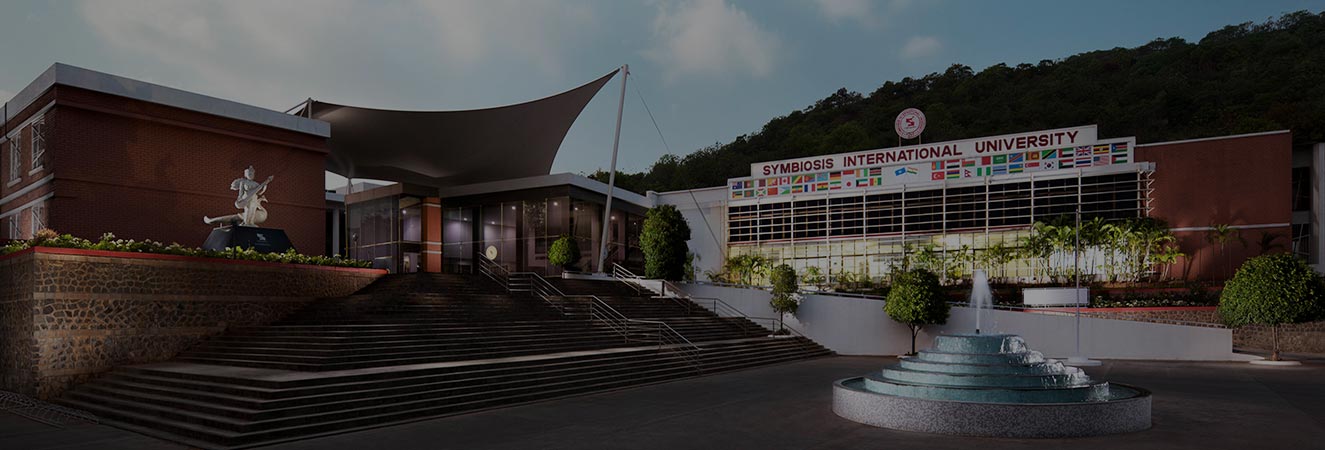
FACULTY/STAFF DEVELOPMENT PROGRAMME
ONE WEEK INTERNATIONAL e-FDP ON RECENT TRENDS AND APPLICATIONS IN ARTIFICIAL INTELLIGENCE
(HEALTHCARE, AGRICULTURE, NLP, ROBOTICS, EXPERT SYSTEMS)
(online mode)
(12th-17th December 2022)
- ONE WEEK INTERNATIONAL e-FDP ON RECENT TRENDS AND APPLICATIONS IN ARTIFICIAL INTELLIGENCE (HEALTHCARE, AGRICULTURE, NLP, ROBOTICS, EXPERT SYSTEMS) (online mode) was organized by Symbiosis Institute of Computer Studies and Research (SICSR), Pune during 12th-17th December 2022.
- A total of 62 participants registered for the eFDP from about 22 different institutions across the country, including from cities like Bangalore, Aurangabad, Chembur, Kalyan (Thane), Kolhapur, Mandangad, Nagpur, Navi Mumbai, Sangli, Satara, Thane, and Pune.
- Out of total participants, 43 were Faculty, 7 were Research scholars, 9 were PG students and 2 were UG students.
- Approximately, 47% participants had completed PhD, another 21% participants were pursuing PhD while remaining 32% comprised of participants from UG/PG students. Professors, Assoc. Professors as well as Asst. Professors comprised the participants from teaching fraternity.
- Following is the list of resource persons:
- Mr. Mataprasad Agrawal, Chief Architect (Data & Analytics), Persistent Systems, Pune, MH, India.
- Dr. Preety Wadhava, Professor at Sheridan College, Mississauga, Ontario, Canada.
- Dr. Vinod Kumar, Associate Professor, Department of CSE, KL (deemed) University, AP, India.
- Dr. Rajanee Kamat, Associate Professor, Chhatrapati Shahu Institute of Business Education and Research, Kolhapur, MH, India.
- Dr. Parag Ravikant Kaveri, Assistant Professor, Symbiosis Institute of Computer Studies and Research (SICSR), Pune.
- Mr. Akshay Pandey, Indian Institute of Technology Roorkee-Roorkee, Uttarakhand, India.
- Dr. Parminder Kaur, Associate Professor, MGM’s JNEC, MGM university, Aurangabad, MH, India.
- Dr. Shrikant Mapari, Assistant Professor, Symbiosis Institute of Computer Studies and Research (SICSR), Pune.
- Dr. Sandeep Gaikwad, Assistant Professor, Faculty of Comp. Sc. and Applications, Charotar University of Science & Technology, Gujarat, India.
- Dr. Baljeet Kaur, Assistant Professor, Symbiosis Institute of Computer Studies and Research (SICSR), Pune.
- Dr. Vivek Singh, Data scientist, Cognizant Technology Solutions, Noida, India.
- Dr. Amol Vibhute, Assistant Professor, Symbiosis Institute of Computer Studies and Research (SICSR), Pune.
- With the blessings and patronage of Dr. S.B. Mujumdar Sir, honourable Chancellor of the Symbiosis International (Deemed University), Pune and Dr. Vidya Yeravdekar, honourable Pro Chancellor of the Symbiosis International (Deemed University), Pune, the eFDP was inaugurated by Mr. Mataprasad Agrawal, Chief Architect (Data & Analytics), Persistent Systems, Pune and Dr. Sachin Naik, Deputy Director, SICSR, Pune on 12th December 2022.
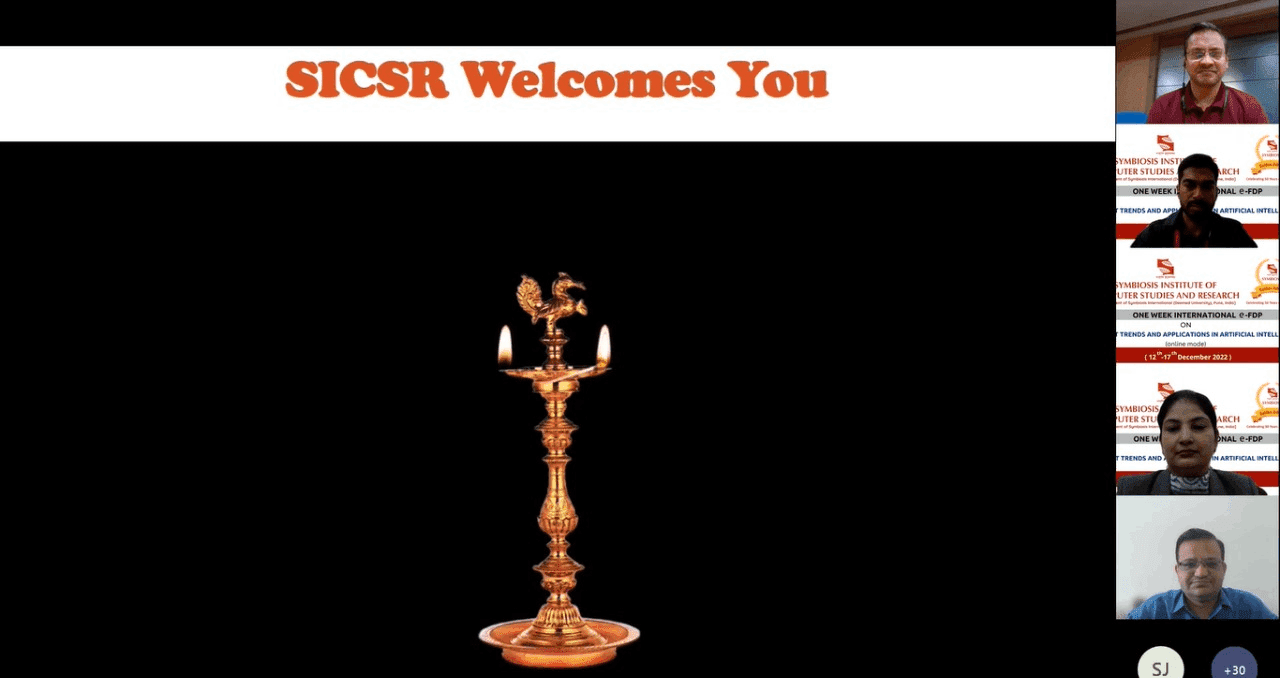
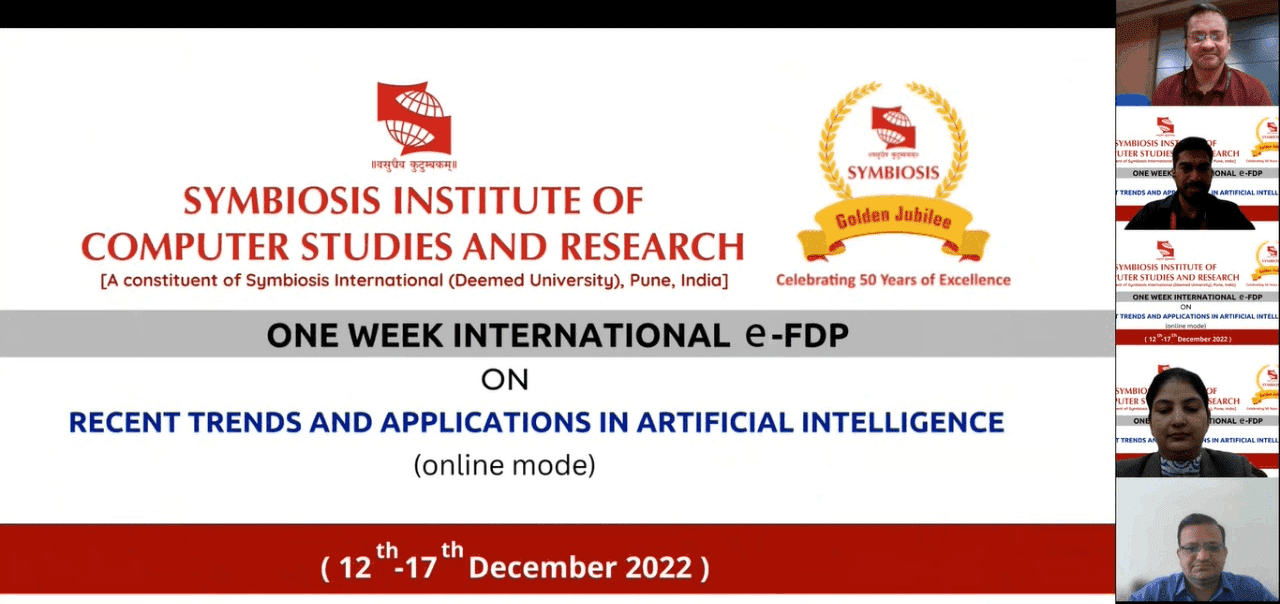
- The eFDP comprised of the following keynote, technical and valedictory sessions:
1. Keynote Address Title: AI in Industry
Speaker : Mr. Mataprasad Agrawal, Chief Architect (Data & Analytics), Persistent Systems, Pune, MH, India.
Date and Time : Monday 12th December 2022 (Morning)
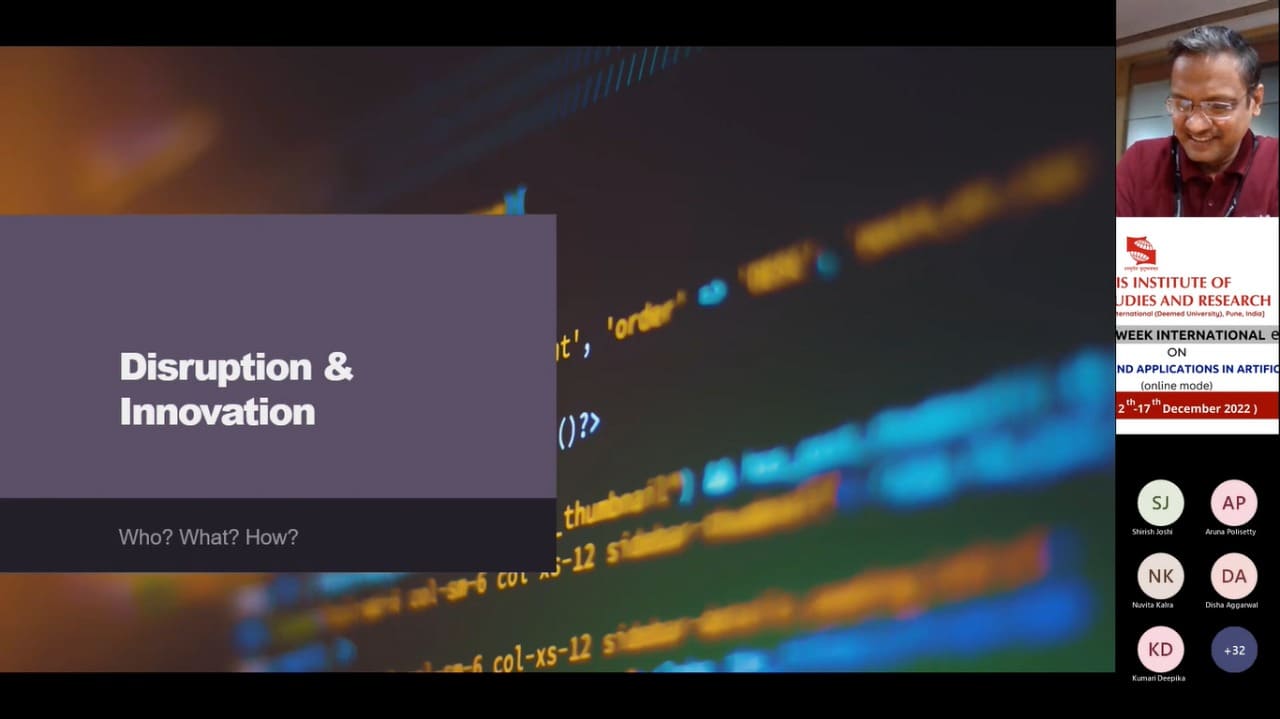
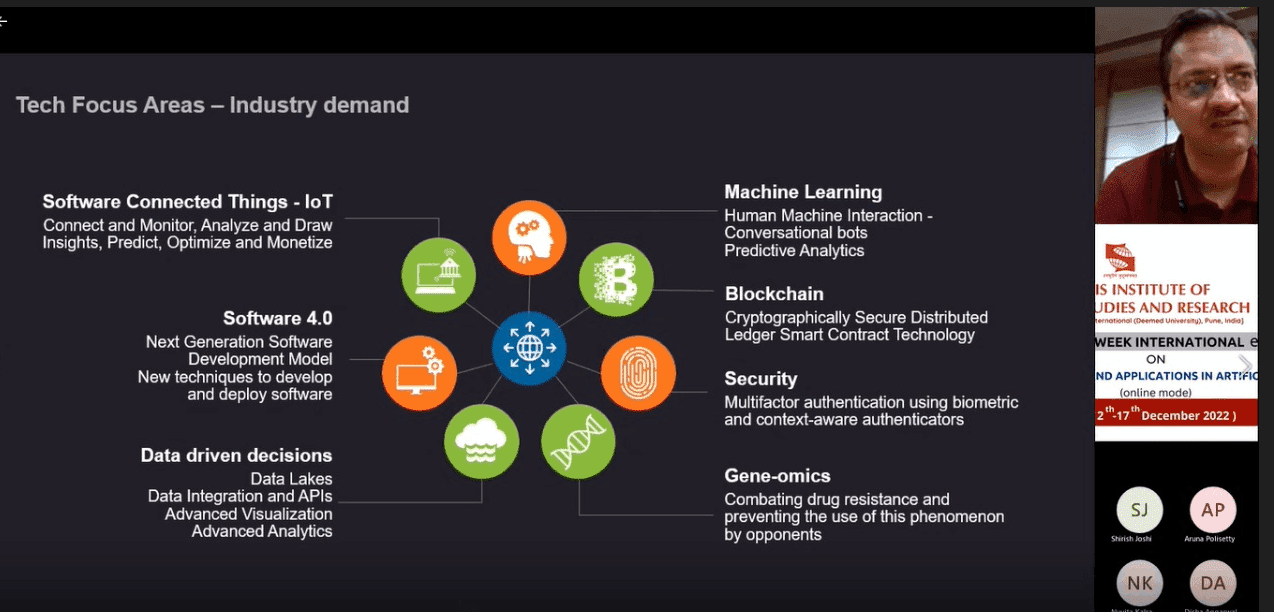
Mr. Mataprasad Agarwal started the session with discussion on disruptive technologies and innovations and expanding our knowledge of programming languages. The future applications of machine learning and artificial intelligence were the main topic of discussion. In addition to this, Mr. Mataprasad Agarwal and the attendees had various encounters. All of the faculty members gained insightful knowledge about how to prepare themselves and the students for this extremely diverse business climate.Overall, the Guest lecturer gave his insights to attendees about the disruptive technologies, cloud-tech innovations and suggested the participants to be more agile regarding their knowledge and abilities.
2. Session Title : AI in Business Intelligence
Speaker : Dr. Preety Wadhava, Professor at Sheridan College, Mississauga, Ontario, Canada.
Day and Date : Monday 12th December 2022 (Afternoon)
The session was largely centred on the application of AI in many sectors, including the automotive, hospitality, banking, and others. First example was how Amazon’s recommendation system contributes 35% of its revenue. How the food chain sector uses AI, Food shops today use blockchain technology to track the history of the food that is accessible. By doing so, they may increase consumer trust through transparency and tractability. As a result of the usage of AI, Walmart’s app displays information such as aisle position, product left, etc. when you need to make a purchase.
The topic of discussion in the banking sector was how BSI: Teradata is utilising AI to help their clients. Big data is a major problem because the banking business develops constantly. Therefore, companies make predictions about the behaviour of their consumers and how or when they will complete transactions, in which IoT (or the recently coined term BoI) plays a significant part. The Case Study of Wall Street came next; it involved two people, one of whom was a hedge fund manager whose investments weren’t doing well and the other of whom was a Hollywood producer who needed money but needed a return on investment. He examined the data that had been passed through it and made inferences. This was carried out by SPSS and answered several inquiries.
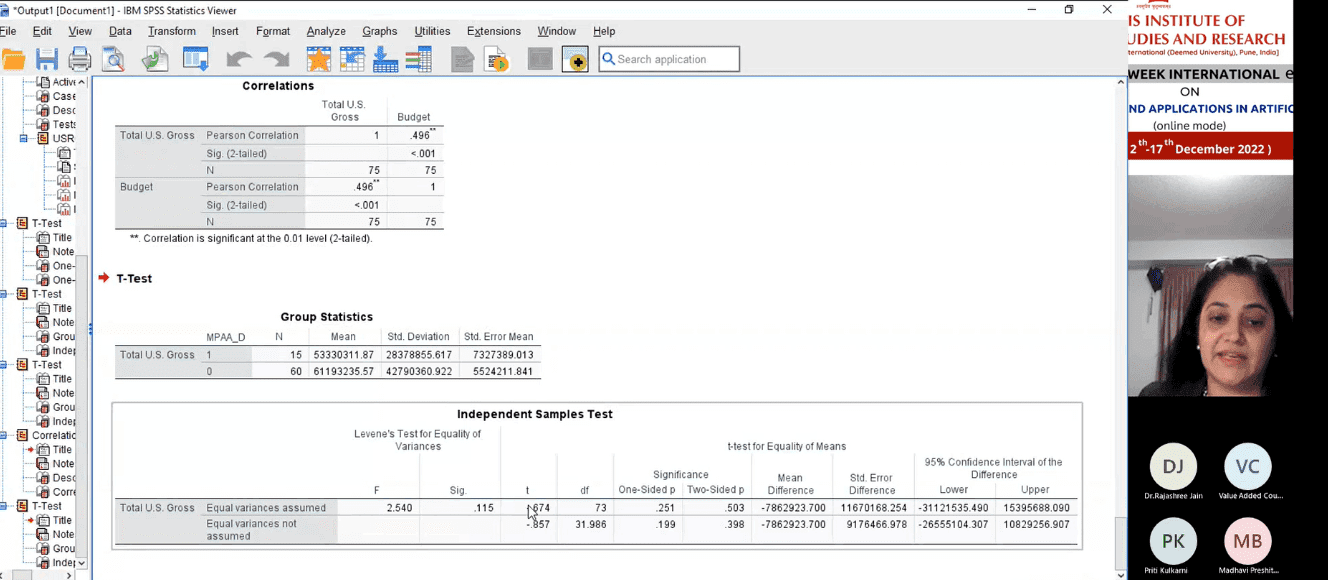
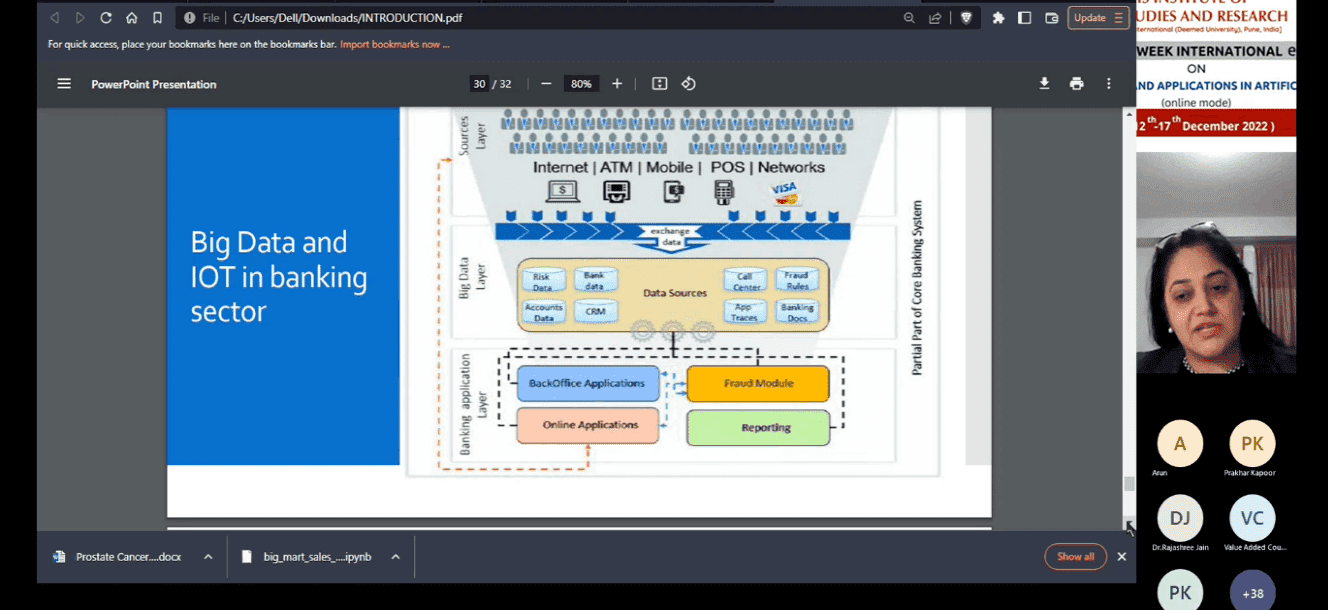
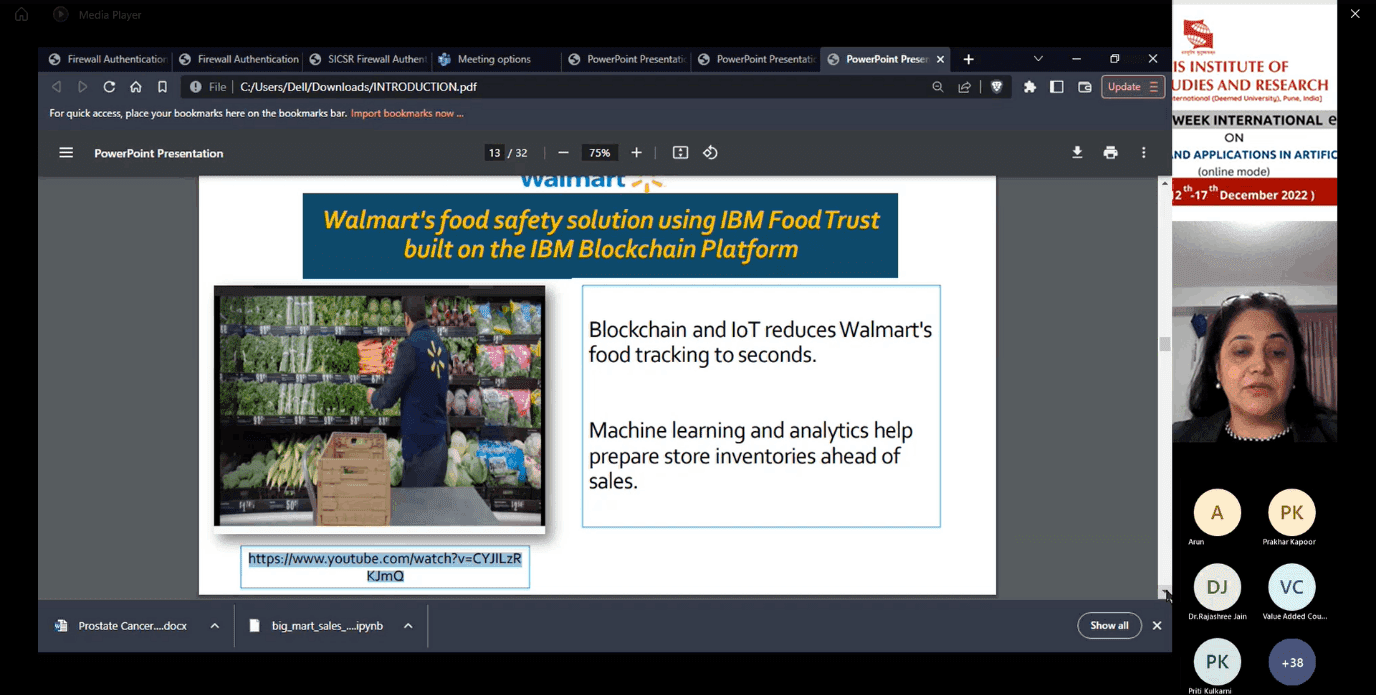
3. Topic : Artificial Intelligence in Healthcare
Speaker : Dr. Vinod Kumar, Associate Professor, Department of CSE, KL (deemed) University, AP, India
Day and Date : Tuesday 13-Dec-22 (Morning)
The speaker explained the concepts of artificial intelligence-based methods for healthcare applications. He introduced the concepts of advance machine learning algorithms used for detecting and predicting various diseases at an early stage. In addition, he demonstrated the use of orange open-source tool for implementing and analysing various datasets like image. The imported images in orange tool can be used to pre-process the data and then we can use various machine learning algorithms for feature extraction, regression and classification. The output can also be validated using confusion matrix, ROC curves, and other methods via orange tool. The session was very informative and appreciated by all the participants and also requested for more sessions on such type of tool.
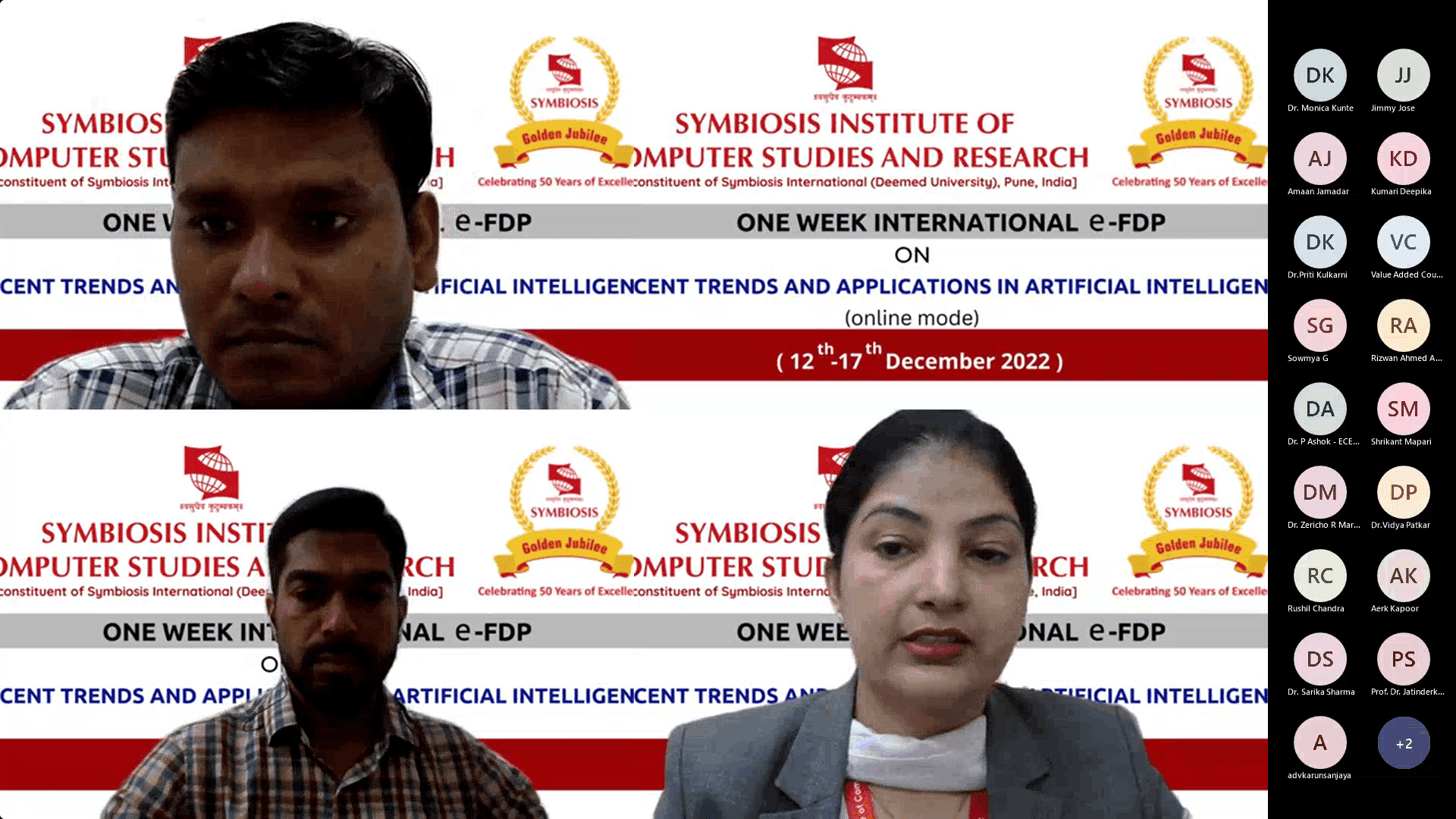
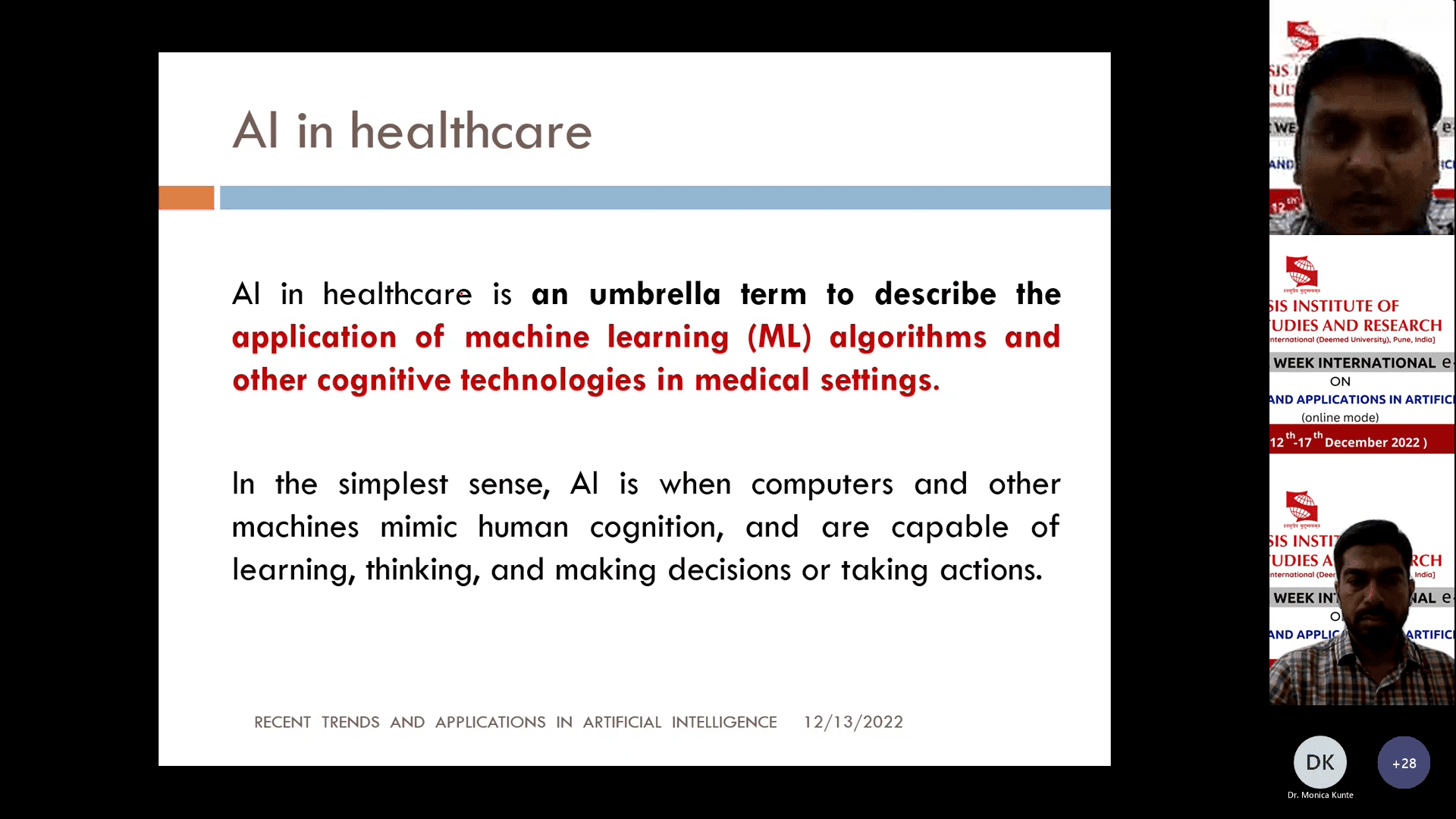
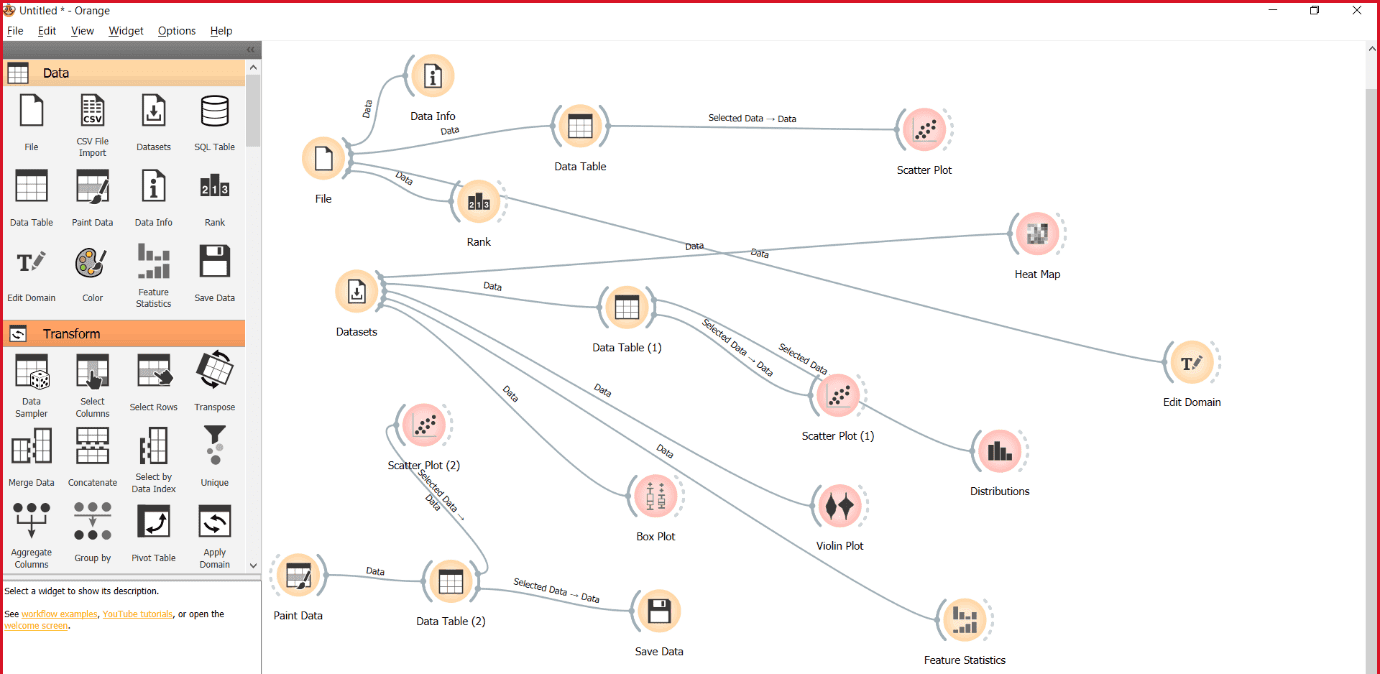
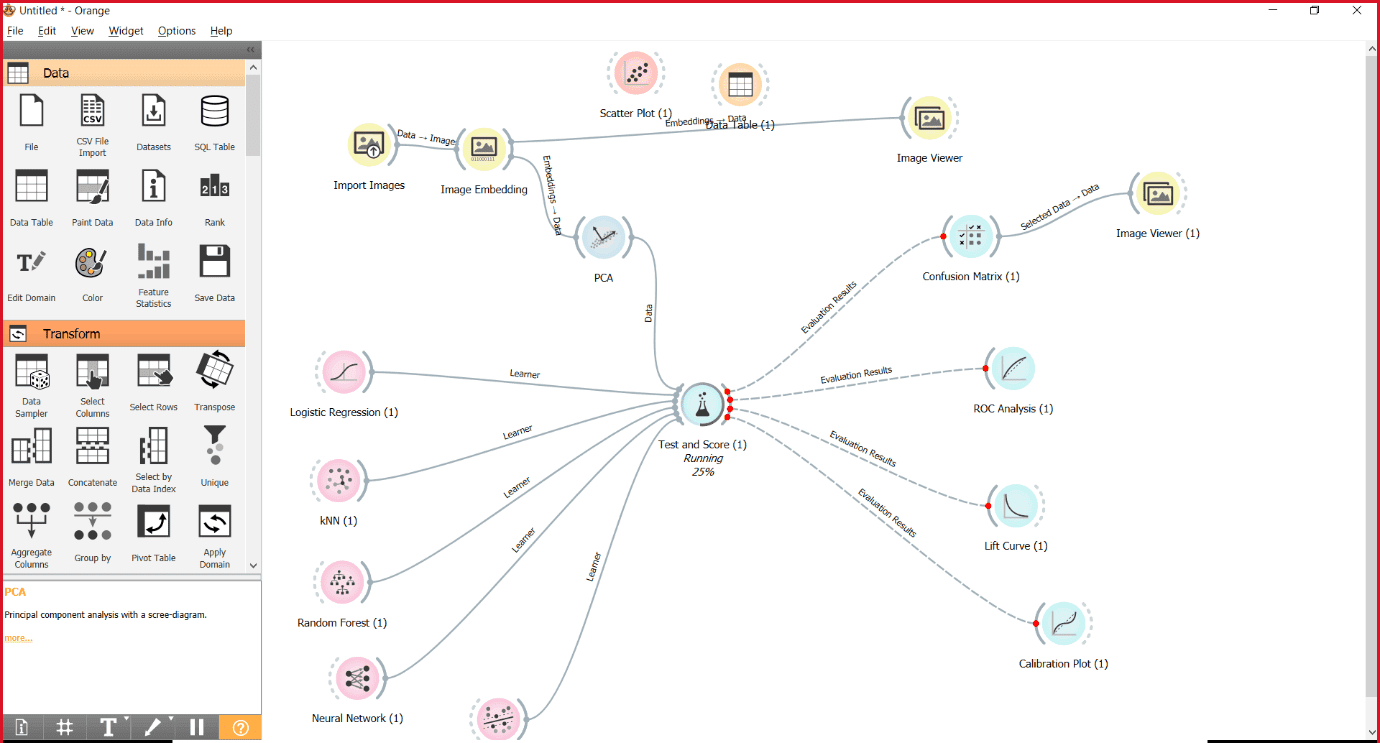
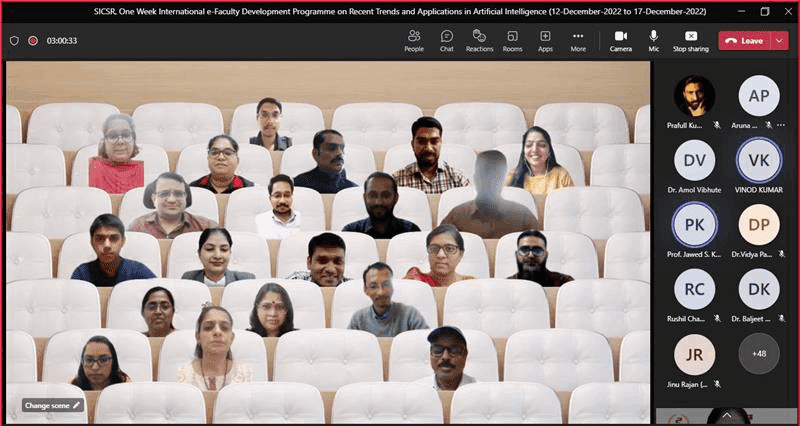
4. Topic : Artificial Intelligence: Concept to Applications
Speaker : Dr. Rajanee Kamat, Associate Professor, Chhatrapati Shahu Institute of Business Education and Research, Kolhapur, MH, India.
Day and Date : Tuesday 13-Dec-22 (Afternoon)
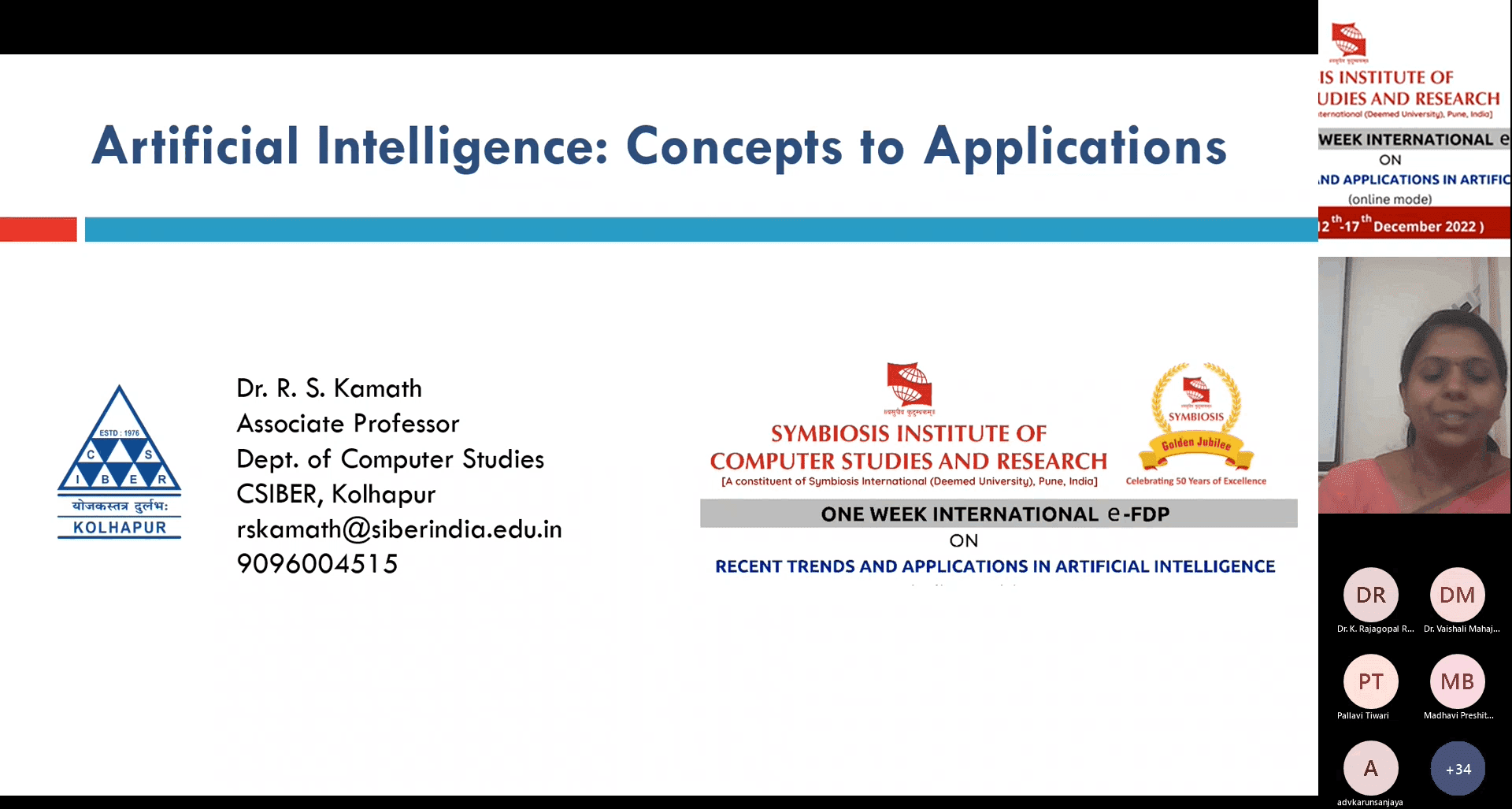
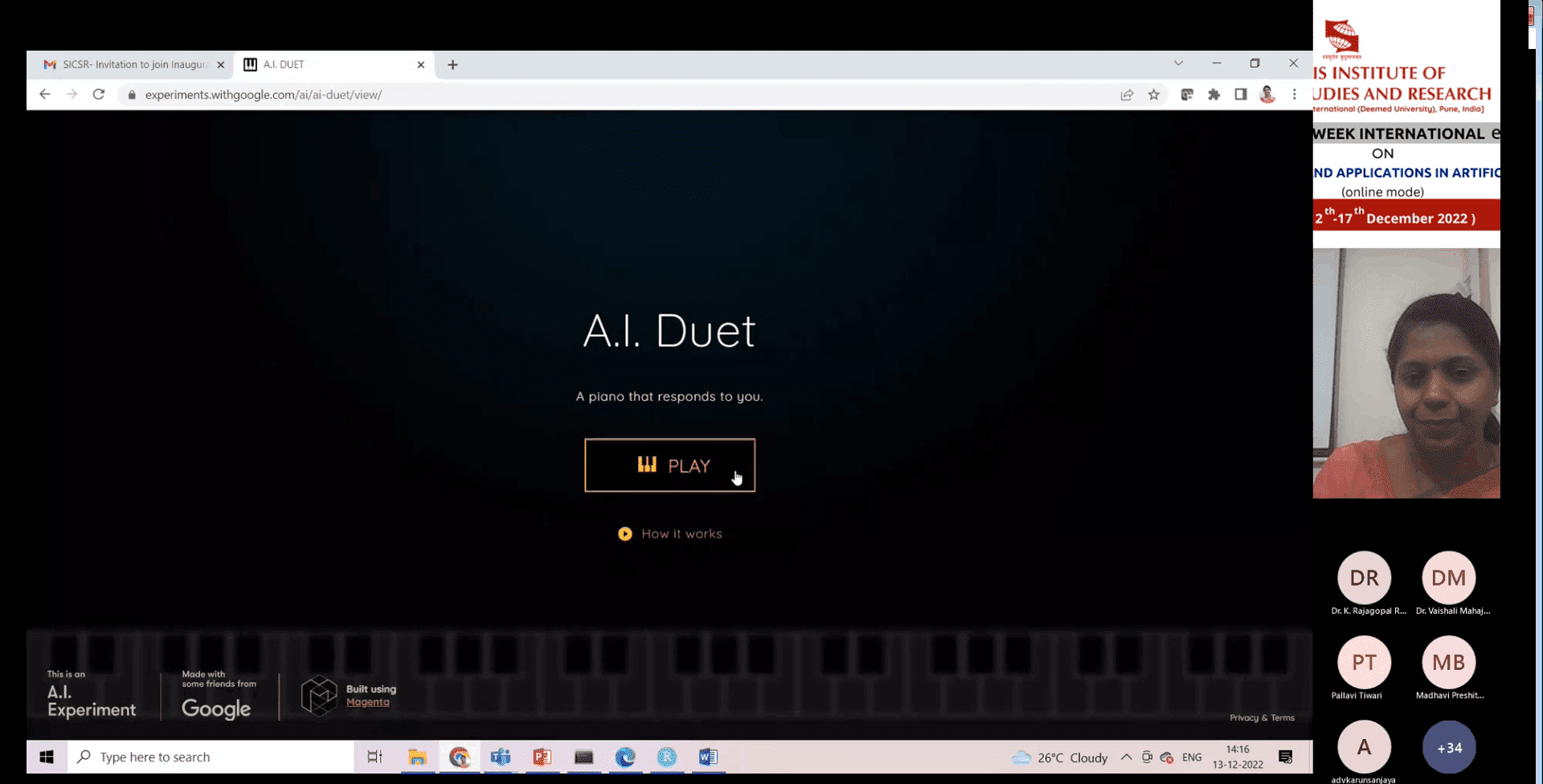
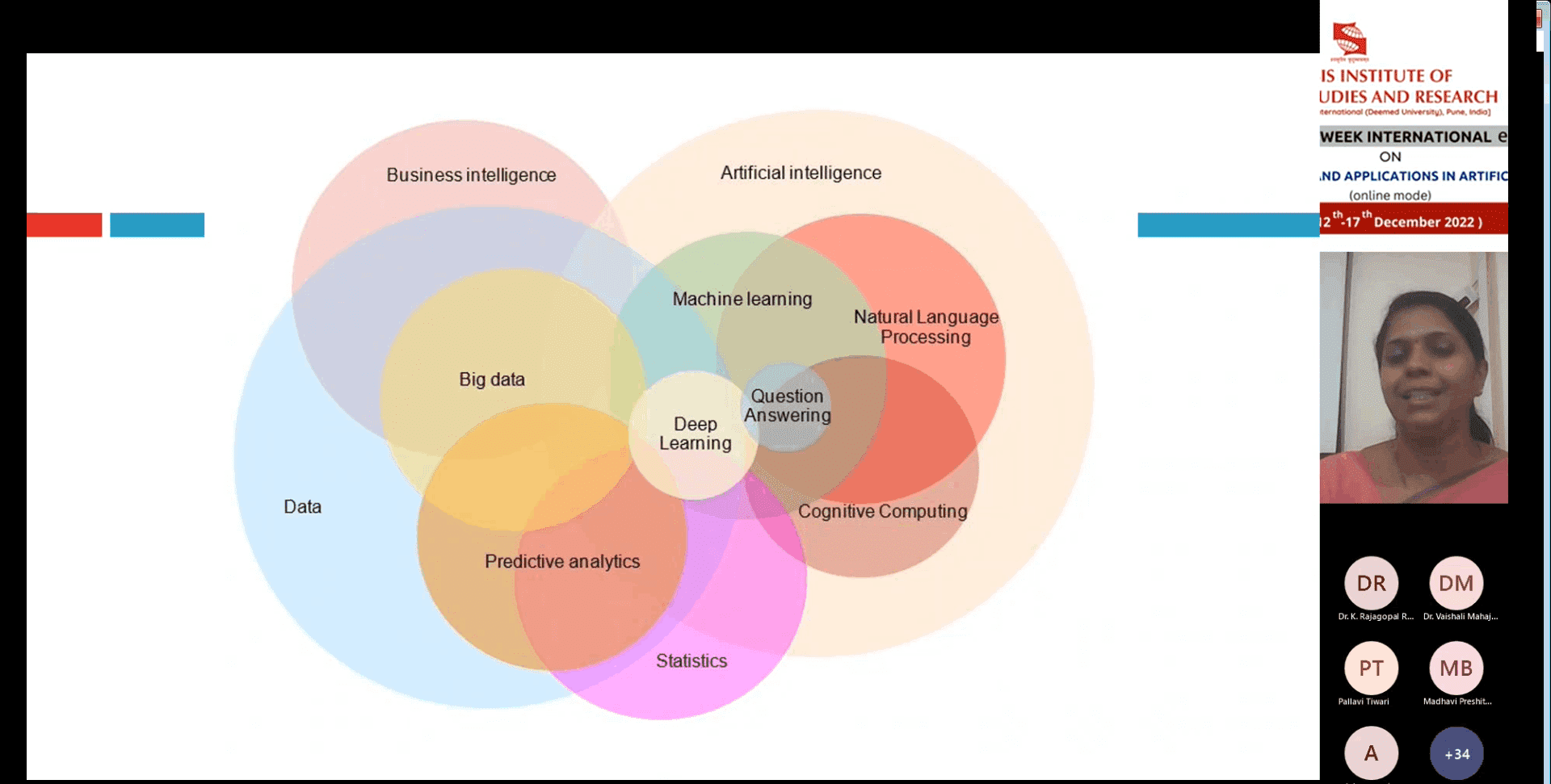
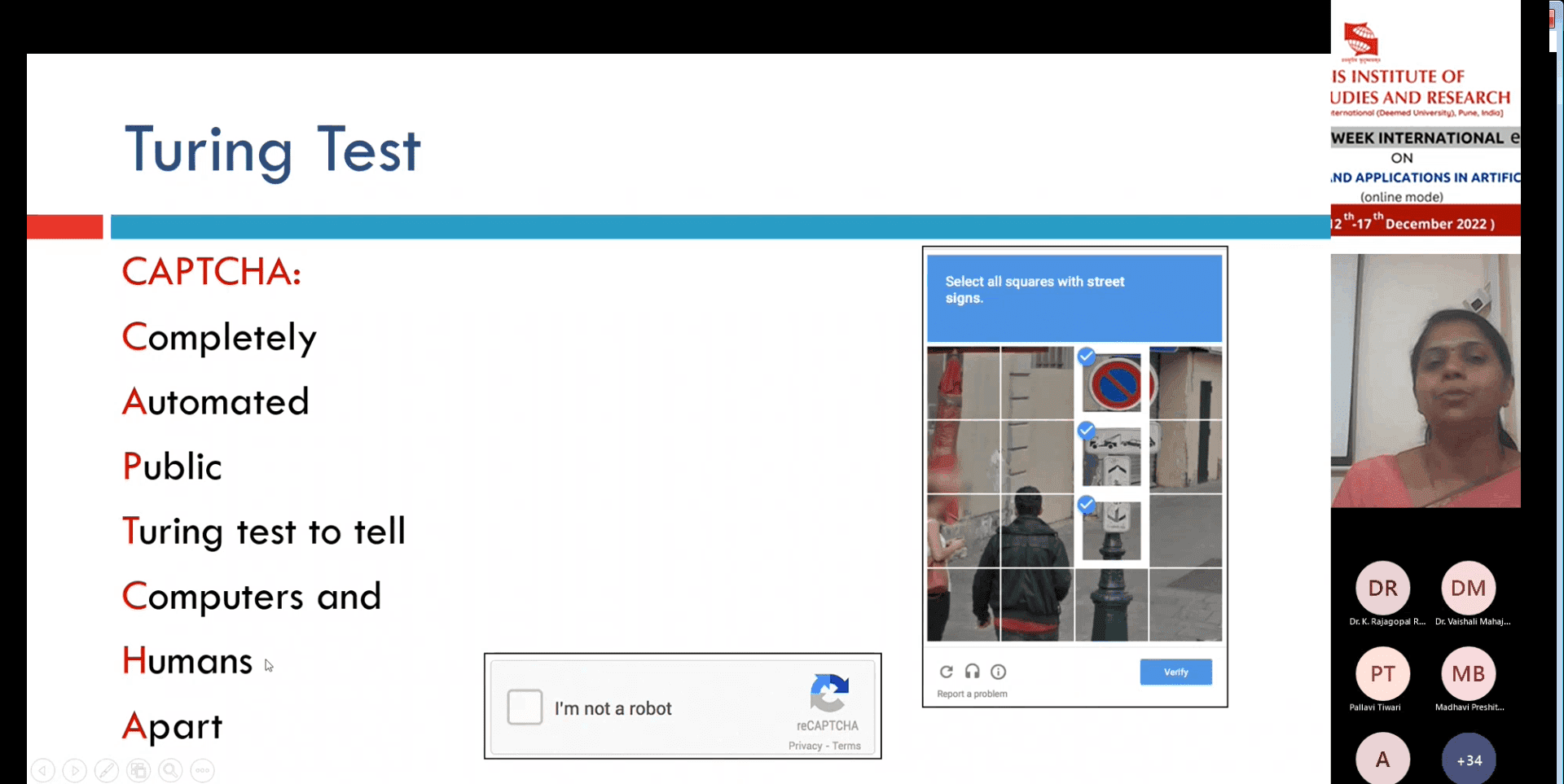
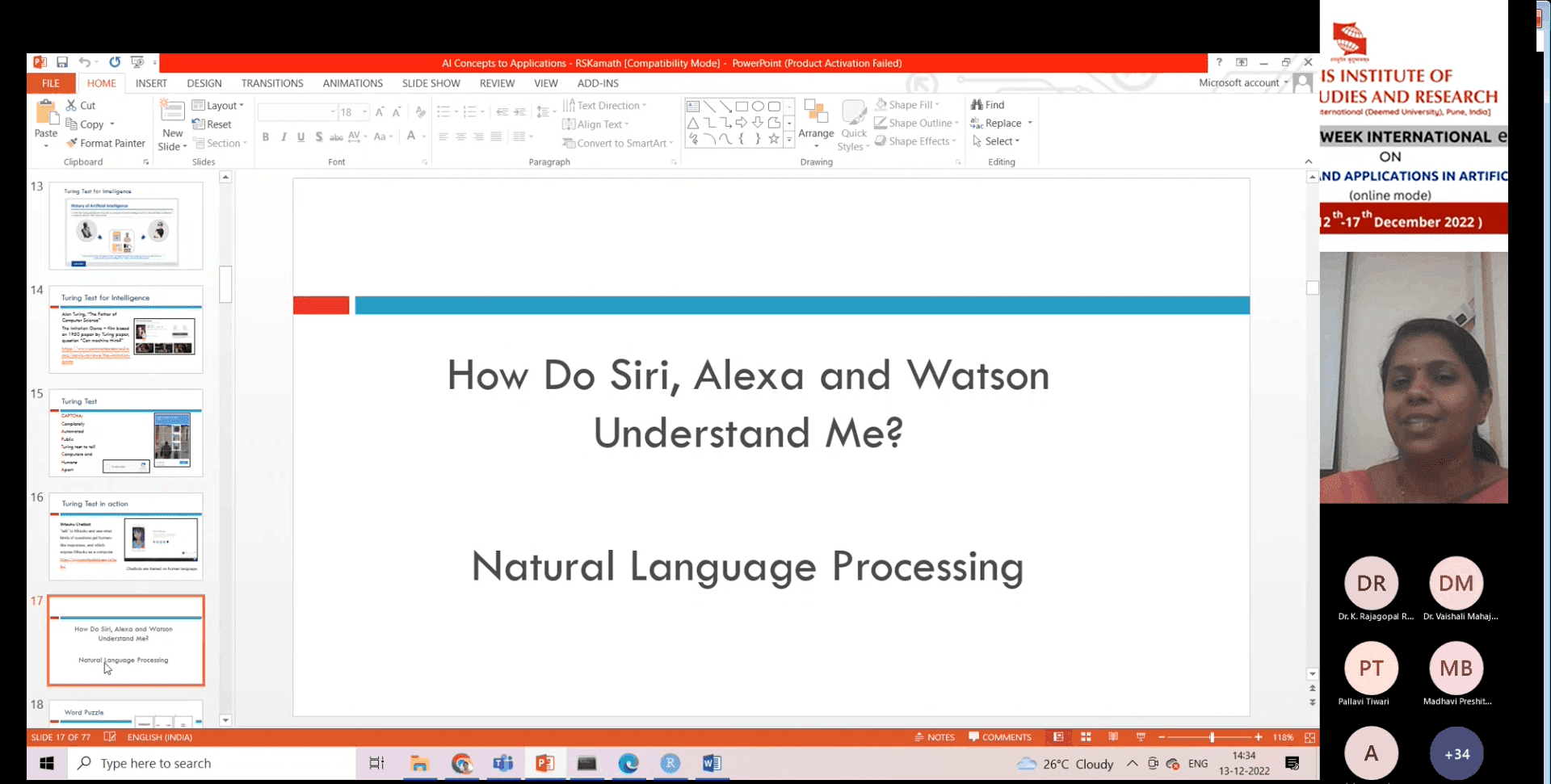
Artificial intelligence (AI) refers to the simulation of human intelligence in machines that are programmed to think and act like humans. These intelligent machines can be trained to perform various tasks, such as recognizing speech and images, making decisions, and solving problems.
There are many different applications for AI, including:
- Natural language processing (NLP): This refers to the ability of machines to understand and generate human-like language. This can be used in applications such as language translation, chatbots, and virtual assistants.
- Image and speech recognition: AI can be used to recognize and classify images and speech, which has applications in areas such as facial recognition and voice assistants.
- Decision-making: AI can be used to analyze data and make decisions based on that data. This can be used in fields such as finance, where it can be used to analyze market trends and make investment decisions.
- Robotics: AI can be used to control robots and make them more intelligent and autonomous. This can be used in manufacturing, healthcare, and other industries.
- Healthcare: AI can be used to analyze medical images, such as X-rays, to detect abnormalities and assist with diagnoses. It can also be used to analyze patient data to identify trends and predict outcomes.
- Education: AI can be used to personalize learning experiences and provide students with customized learning plans.
- Customer service: AI can be used to assist customers through chatbots and virtual assistants, which can handle a large volume of inquiries and provide quick responses.
There are many other potential applications for AI, and research and development in this field is ongoing.
5. Topic : Application of AI in Robotics
Speaker : Dr. Parag Ravikant Kaveri, Assistant Professor, Symbiosis Institute of Computer Studies and Research (SICSR), Pune.
Day and Date : Wednesday 14 December 2022 (Morning)
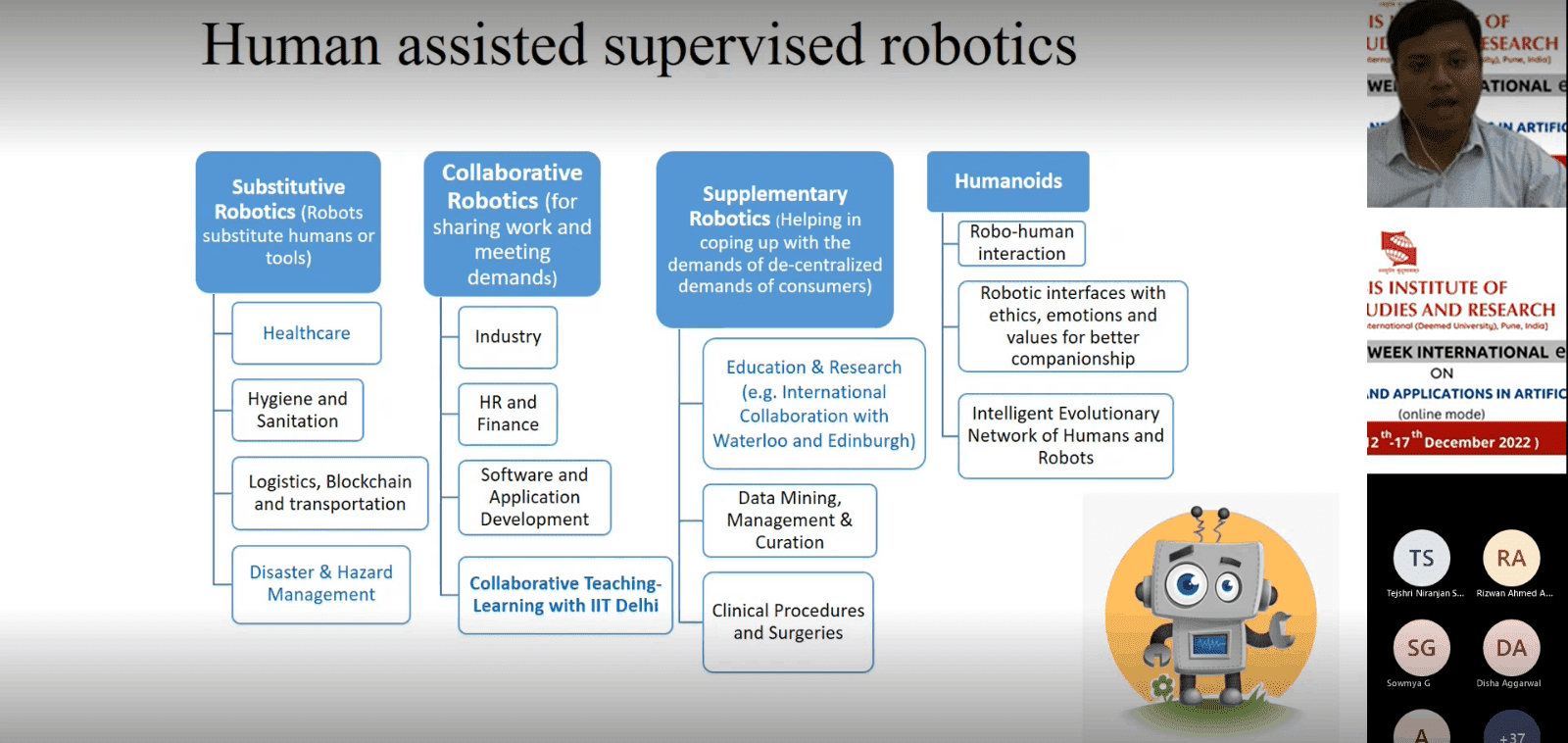
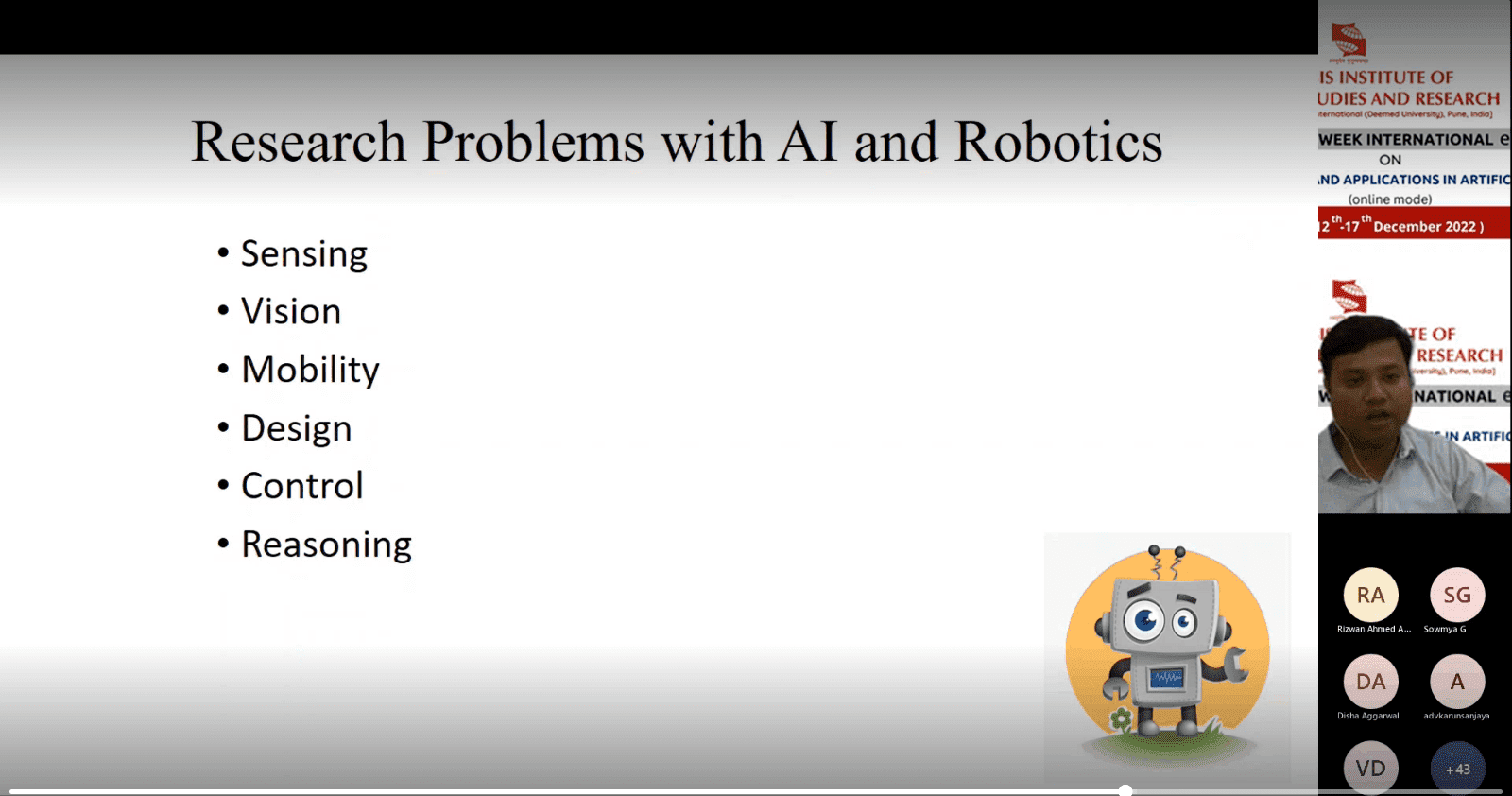
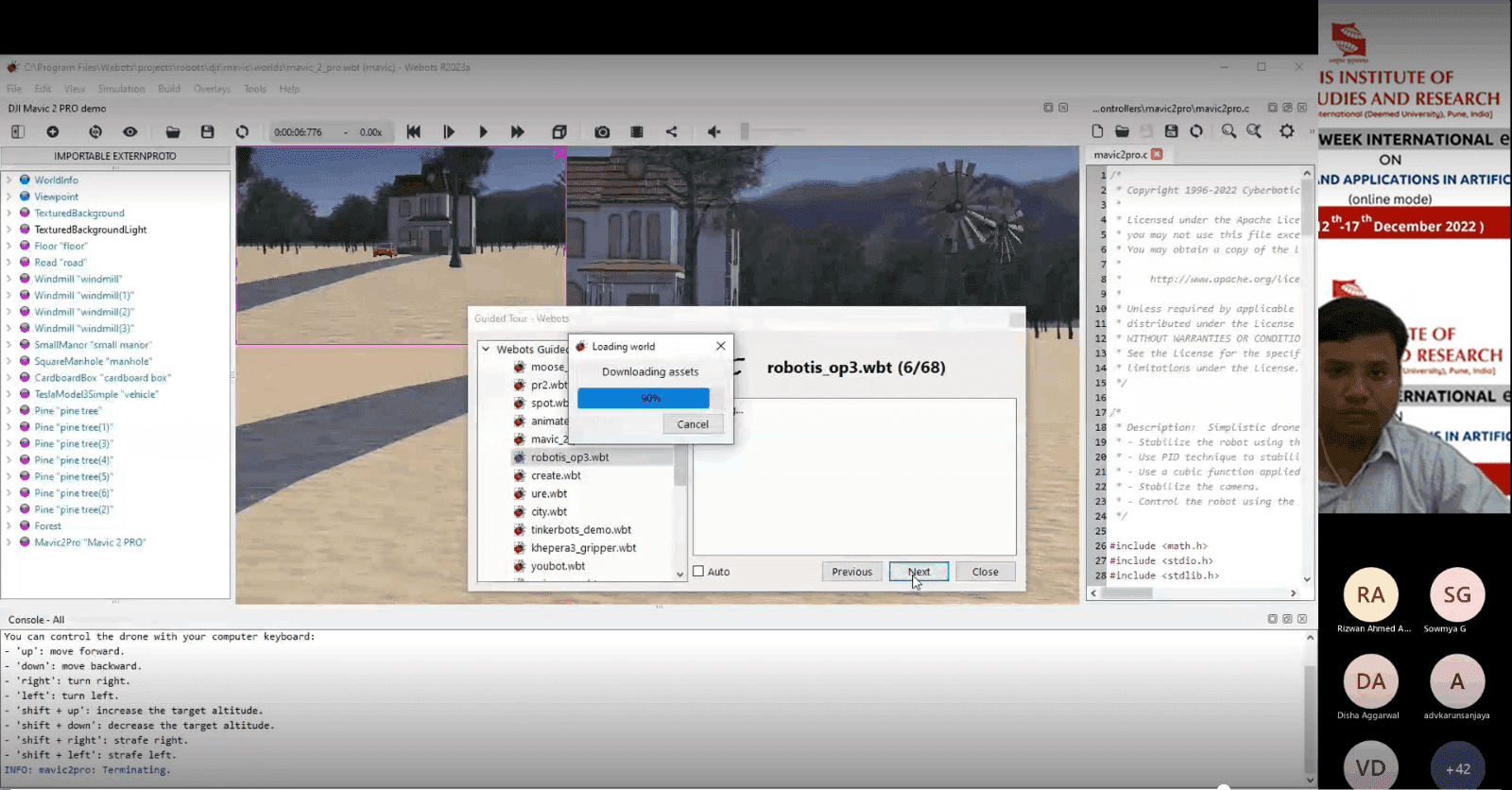
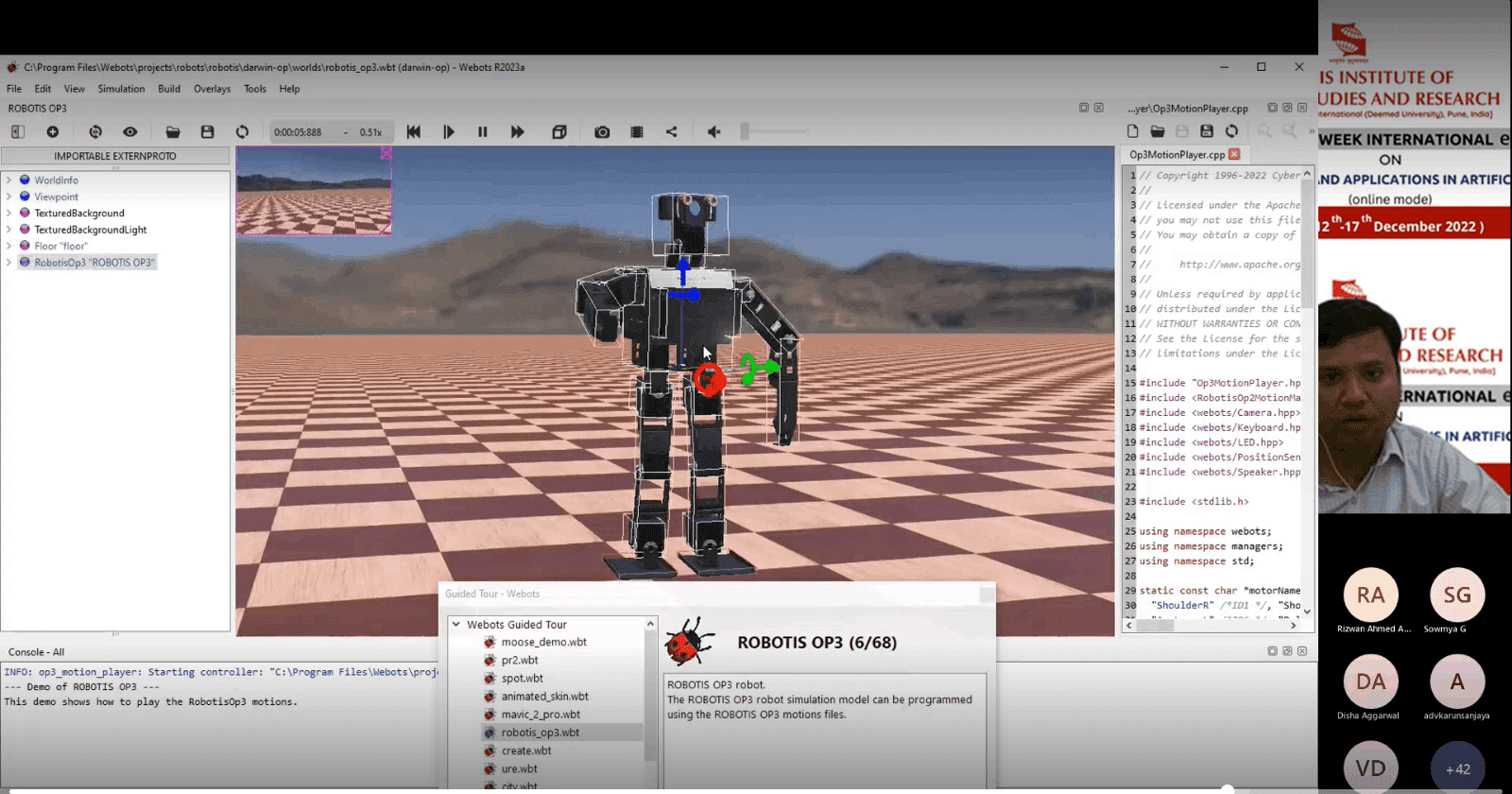
The sessions objectives included raising awareness of Applications of A.I in Robotics and innovations and exploring the abilities of current A.I systems.The future applications of A.I in Robotics and the level of complexity of current A.I systems were the main topic of discussion. Overall, the lecturer gave his insights to attendees about A.I in robotics, also Dr. Parag demonstrated an example of a robot simulation in Webots, which is an open source robot simulation. At the end Dr. Parag had a Q/A session with the attendees.
6. Topic : An Intelligent System for crop classification
Speaker : Mr. Akshay Pandey, Indian Institute of Technology Roorkee-Roorkee, Uttarakhand, India.
Date and Time : Wednesday 14 December 2022 (Afternoon)
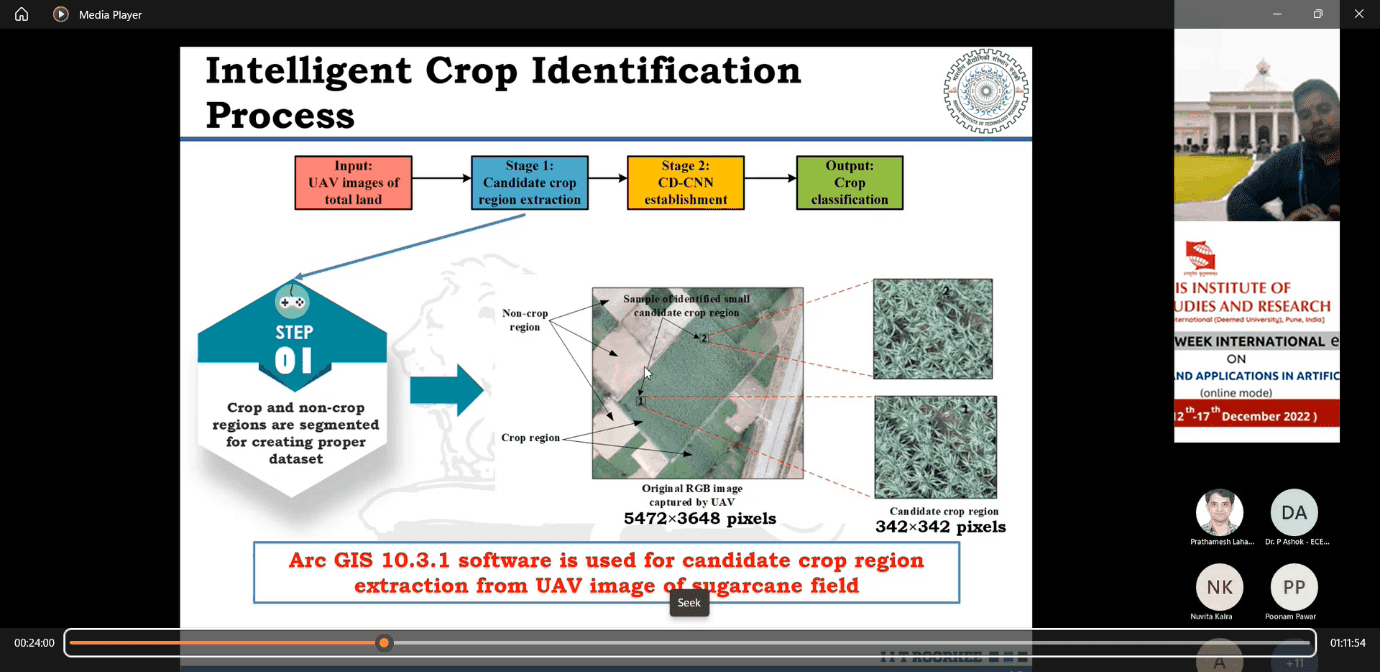
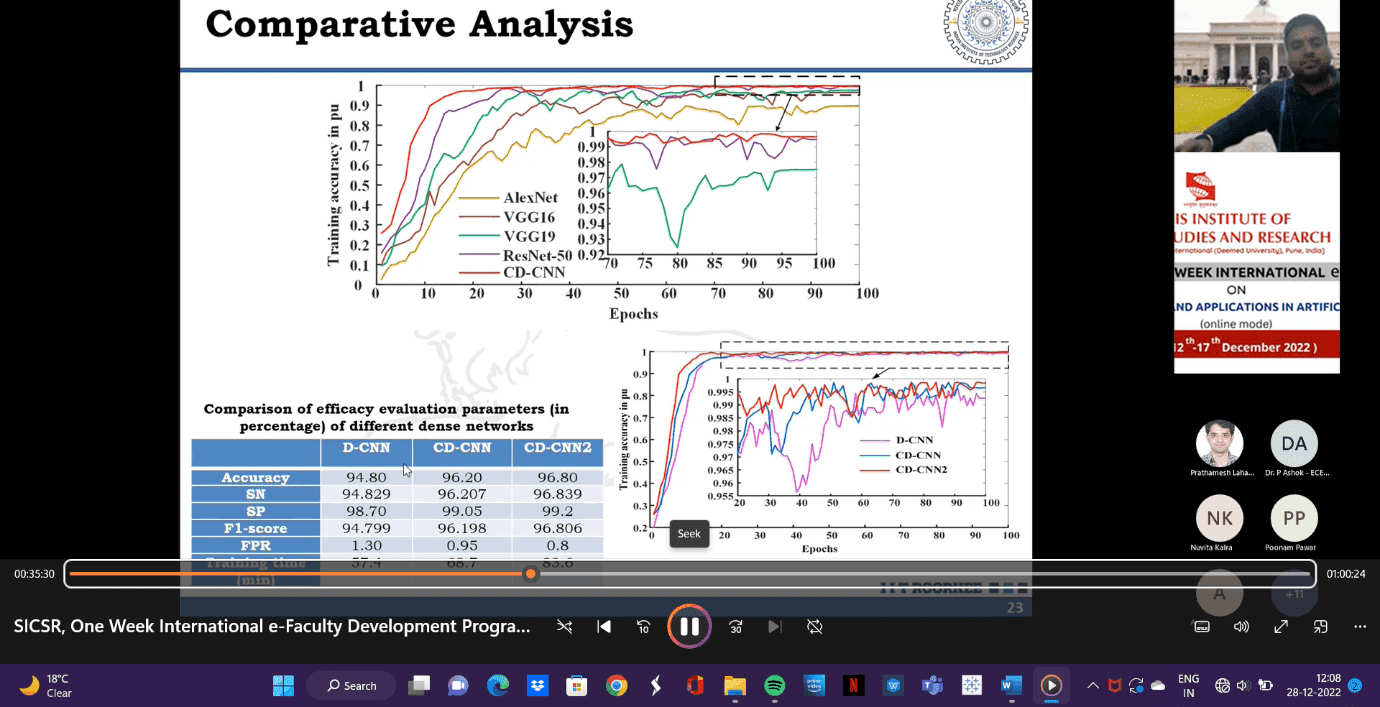
Akshay Pandey, who is currently in IIT Roorkee as well as he has some experience in Web Development and others, here he discussed Artificial Intelligence in the agricultural department, where it has been concluded that for every nation’s economic sector, agriculture is essential. The need for food is rising along with the global population daily. Currently, the farmers’ traditional techniques are unable to meet the demand. Various innovative automation approaches have been devised to meet these needs and give many people in this industry fantastic career prospects. In every industry, including education, banking, robotics, agriculture, etc., artificial intelligence has emerged as one of the most significant technological advancements. It is revolutionizing the agriculture industry and playing a very important part in the agricultural sector.
AI protects the agriculture industry from several concerns, including food safety, population increase, climate change, and job issues. Thanks to AI, modern agriculture has advanced to a new level. Crop production, real-time monitoring, harvesting, processing, and marketing have all been enhanced by artificial intelligence. Various high-tech computer-based systems are created to identify numerous crucial criteria, including weed detection, yield detection, crop quality, and many more. The adoption of AI solutions will play a significant role in the development of AI in agriculture. Even though some extensive studies are ongoing, and some applications are currently available on the market, the agricultural industry still needs improvement. Additionally, the development of anticipatory solutions to address a genuine problem encountered by farmers in farming is still in its early stages.
7. Topic : Deep Learning in Agriculture
Speaker : Dr. Parminder Kaur, Associate Professor, MGM’s JNEC, MGM university, Aurangabad, MH, India.
Date and Time : Thursday 15 December 2022 (Morning)
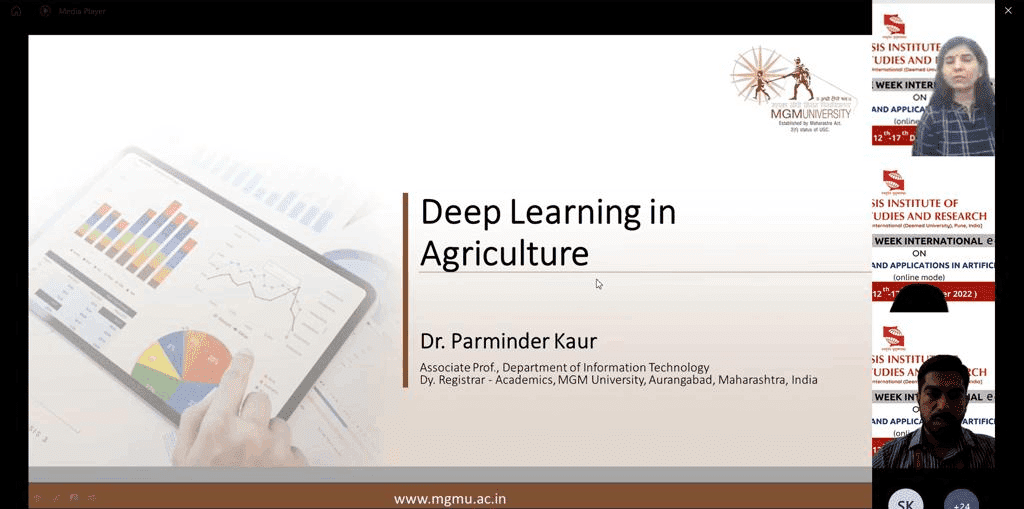
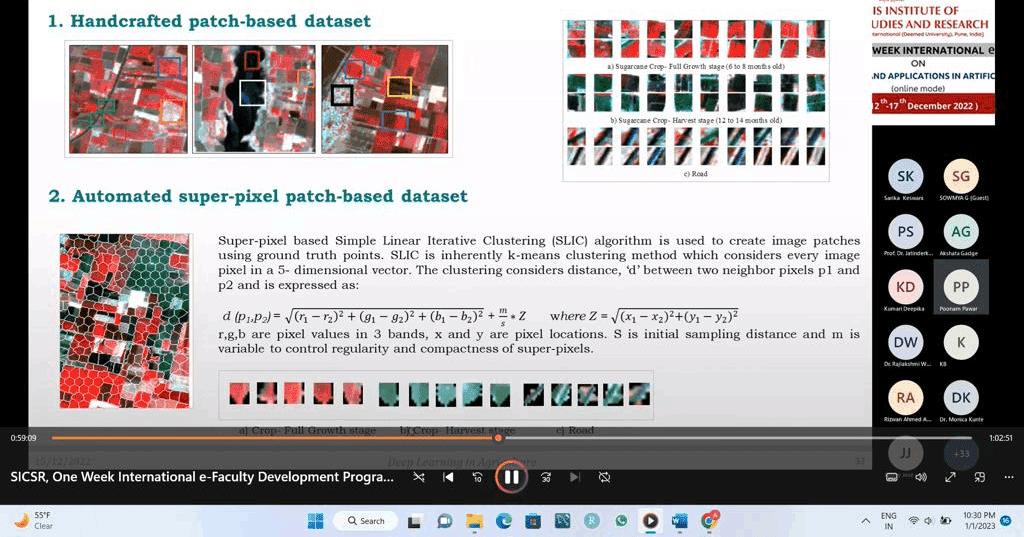
Mrs Parminder Kaur introduced Deep learning in Agriculture. Agriculture monitoring has been in use through ages government is also using such monitoring systems data can be taken through satellite for free and some specific spectral resolutions from paid webside. Earlier field surveys were done through govt which costed and was error bcs manual noe when we do satellite remote sensing data is much better. Spatial Data Mining using remote sensing: Spatial data mining evolved from mining fields in computer science and statistics we do data mining with the help of decision trees, support vector machines etc, to understand how our model is performing, With this deep learning is also a decade old so we can explore more in this field Things that need to be in consideration while using remote sensing data, so for this we need to explore spatial data mining at good depth understand features we also need to understand spectral and spatial resolutions like temporal frequency and spectral sensor For the experimentation done deep learning techniques is explores actively for data extraction We should look at literature review before proceeding forward should prefer published ones. The major findings that we got were :Supervised classification methods perform better than unsupervised methods Higher classification accuracies are obtained for high spatial resolution images and accuracy is enhanced if spectral , spatial parameters are integrated, fused images produce better classification accuracies, NDVI texture aids in classification accuracies, deep neutral networks are found to produce higher accuracies for very high resolution images, Deep neutral networks require large amount of training samples. Investigated the characteristics of agricultural land, study spectral characteristics to identify crop stage, explore spatial data mining algorithms, analyze results and assess their suitability for crop analysis. Using QUAC tool one can remove impurities from satellite collected data.
Deep Convolution Neutral Network Setup:
Step 1: Design the deep neutral network
Step 2: Preparation of training and test dataset
Step 3: Automated pixel based database
Step 4: Training the deep network
Step 5: Frame work to perform classification
We can conclude that we developed dcnn model or classifier for crop land classification using multi source data so the proposed hybrid deep network is the new approach where decision level fusion is implemented to enhance classification performance and image classification is performed in images from different sensor providing multispectral and hyper spectral images , developed dcnn for pixel based and patch based image classification signification of proposed deep learning approach is effective automated feature extraction from medium resolution multispectral and hyper spectral data producing satisfactory classification results and also in use of multi source data for higher classification performance.
As of future scope thus work can be further extended for classification of different types of crops present in the large area, classified image can be used for area estimation, crop yield prediction and drought analysis, proposed deep learning methodology can be further modified to include time series images for identifying crop growth stage.
8. Topic : Application of AI for Mobile Apps
Speaker : Dr. Shrikant Mapari, Assistant Professor, Symbiosis Institute of Computer Studies and Research (SICSR), Pune.
Date and Time : Thursday 15 December 2022 (Afternoon)
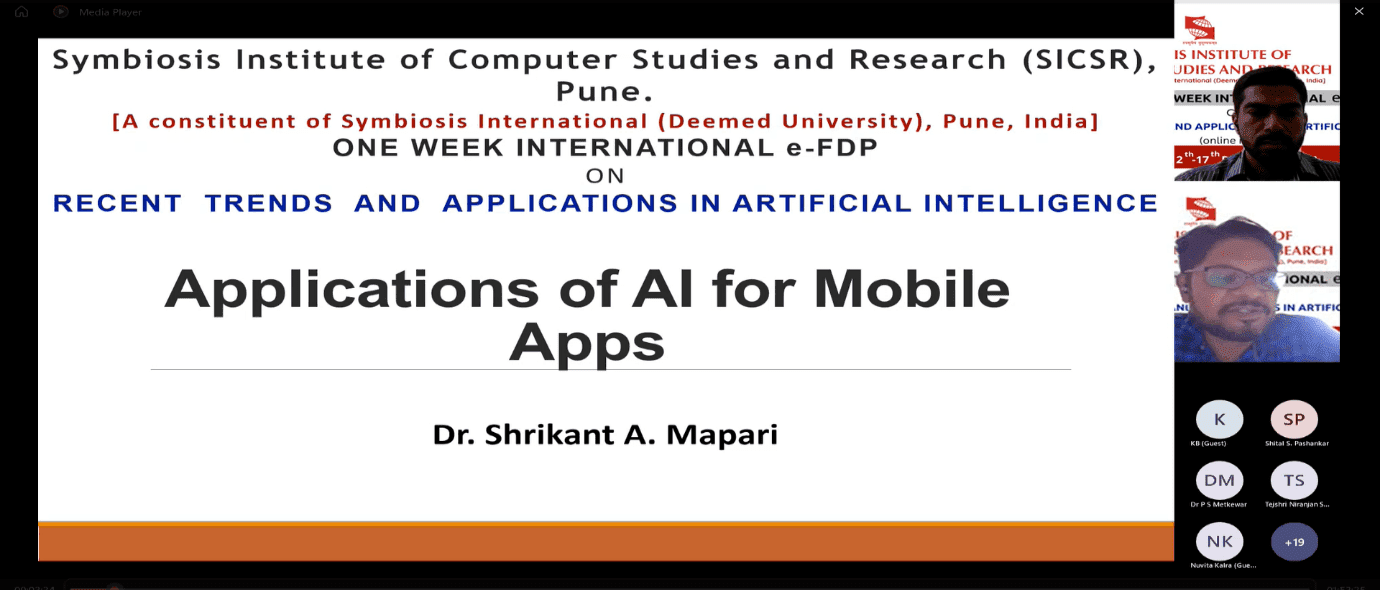
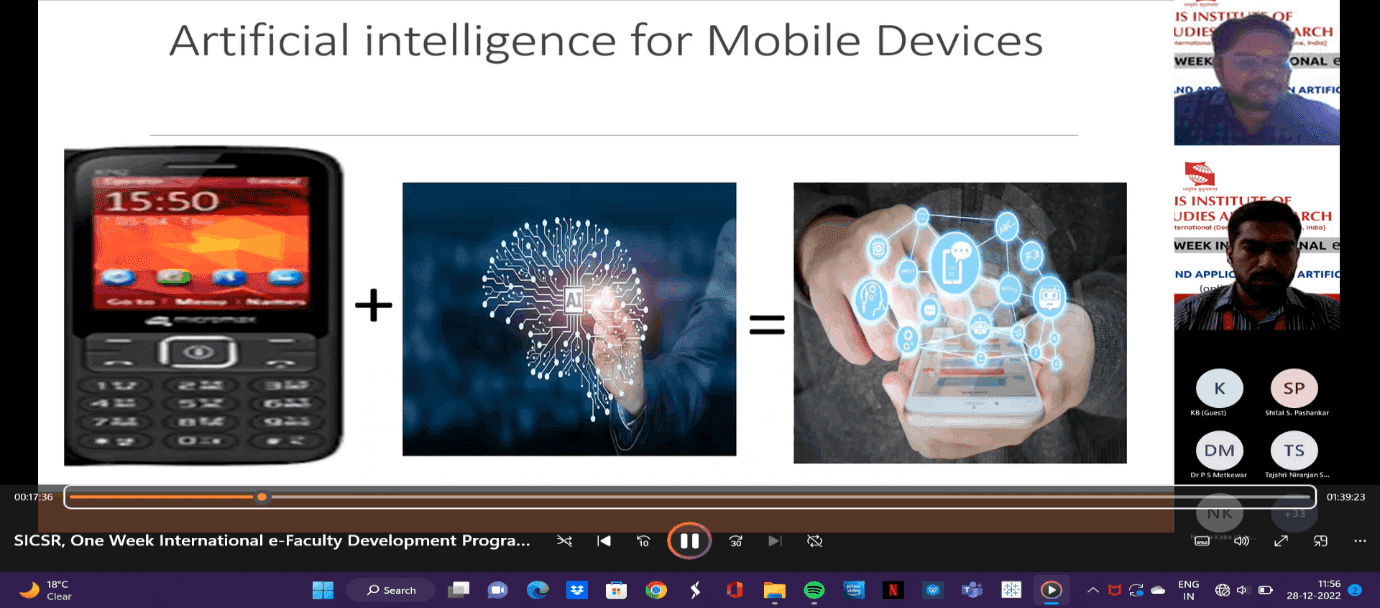
Dr. Shirikant A. Mapari, who has more than 19 years of experience in teaching and is currently employed with SICSR, was the speaker. Applications of Al for mobile applications were the subject of his presentation. He spoke about why AI is there in mobile applications; it has been mentioned that AI makes it easier for customers and users to interact with your solution. It essentially facilitates a more customized experience. Sophisticated algorithms make sentiment analysis and emotion definition possible, creating more potential to enhance services and goods. Mobile apps with AI capabilities complete things more quickly than people. Artificial intelligence (AI) helps businesses run more efficiently by handling tasks like data processing, customer service, and managing some workflows. AI in mobile apps is mostly used to address consumers’ everyday issues and improve their quality of life. Video game responsiveness and adaptability are referred to as artificial intelligence. These AI-powered interactive experiences are typically created by NPCs, or non-player characters, that behave intelligently or imaginatively as though they were being directed by a human gamer.AI can gather crucial information from mobile devices, such as location, contacts, and everyday activities, to improve user engagement and resolve difficult issues.
9. Topic : Role of Geointelligence in Agriculture
Speaker : Dr Sandeep Gaikwad, Assistant Professor, Faculty of Comp. Sc. and Applications, Charotar University of Science & Technology, Gujarat, India.
Date and Time : Friday 16 December 2022 (Morning)
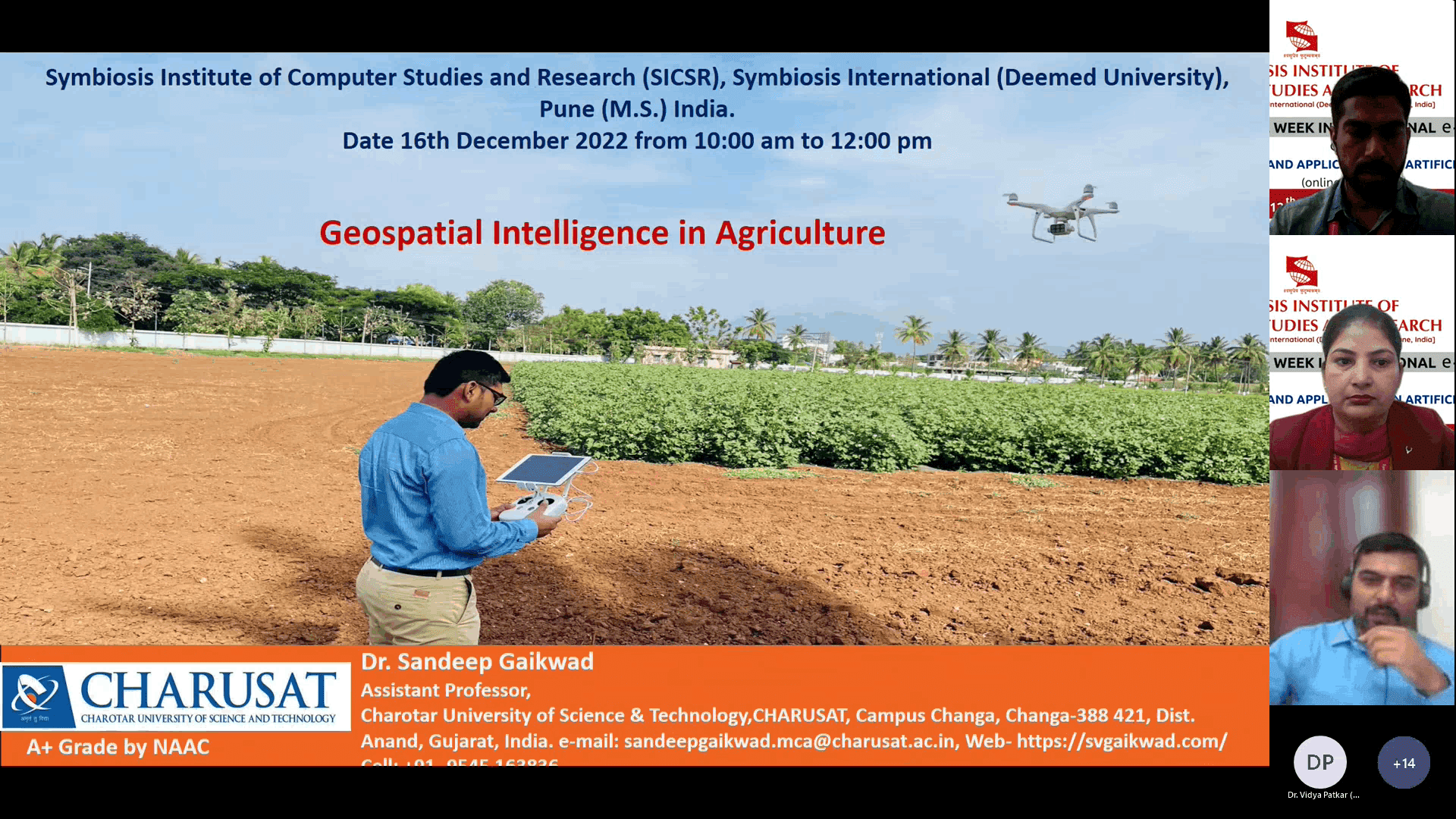
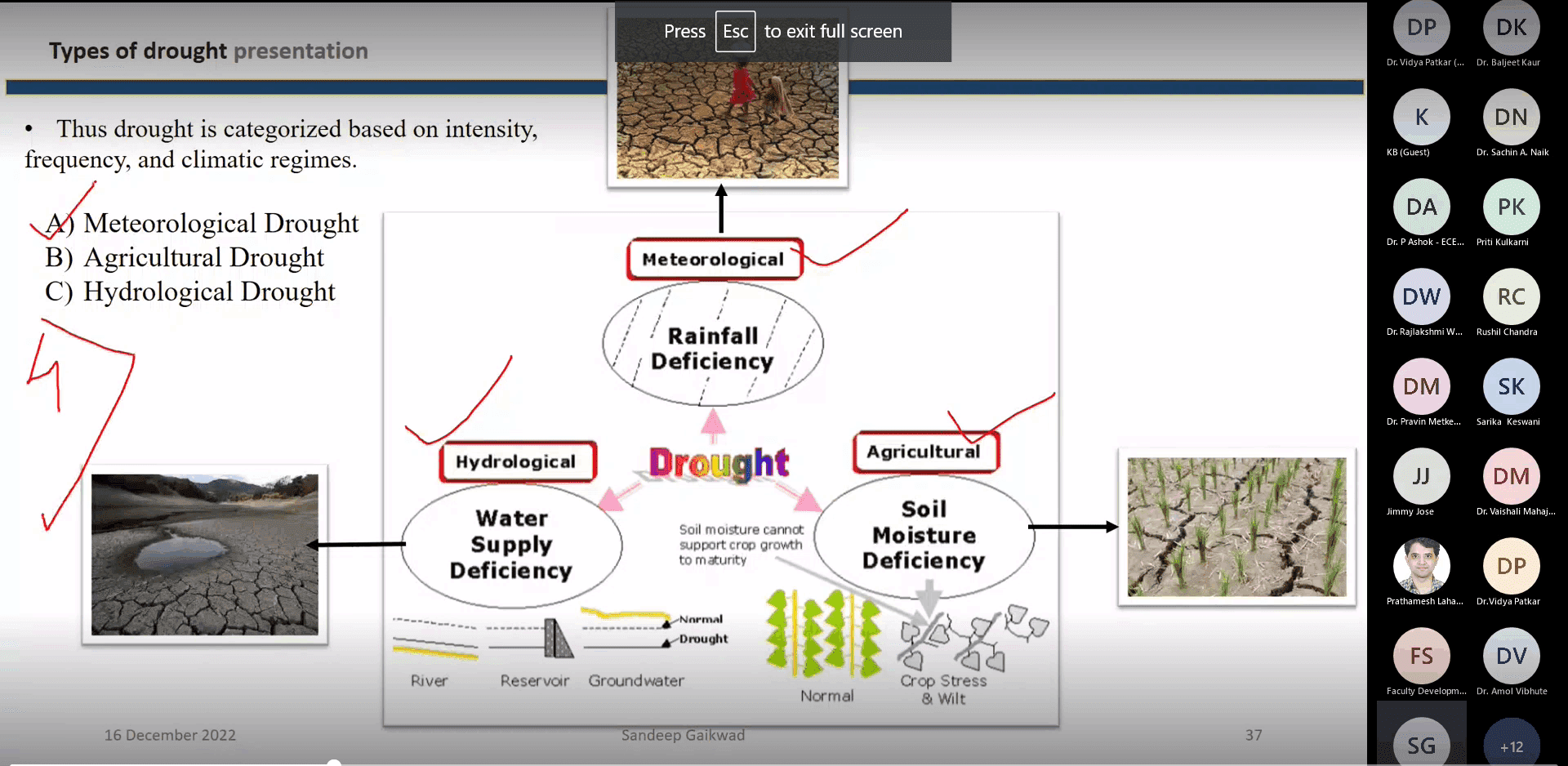
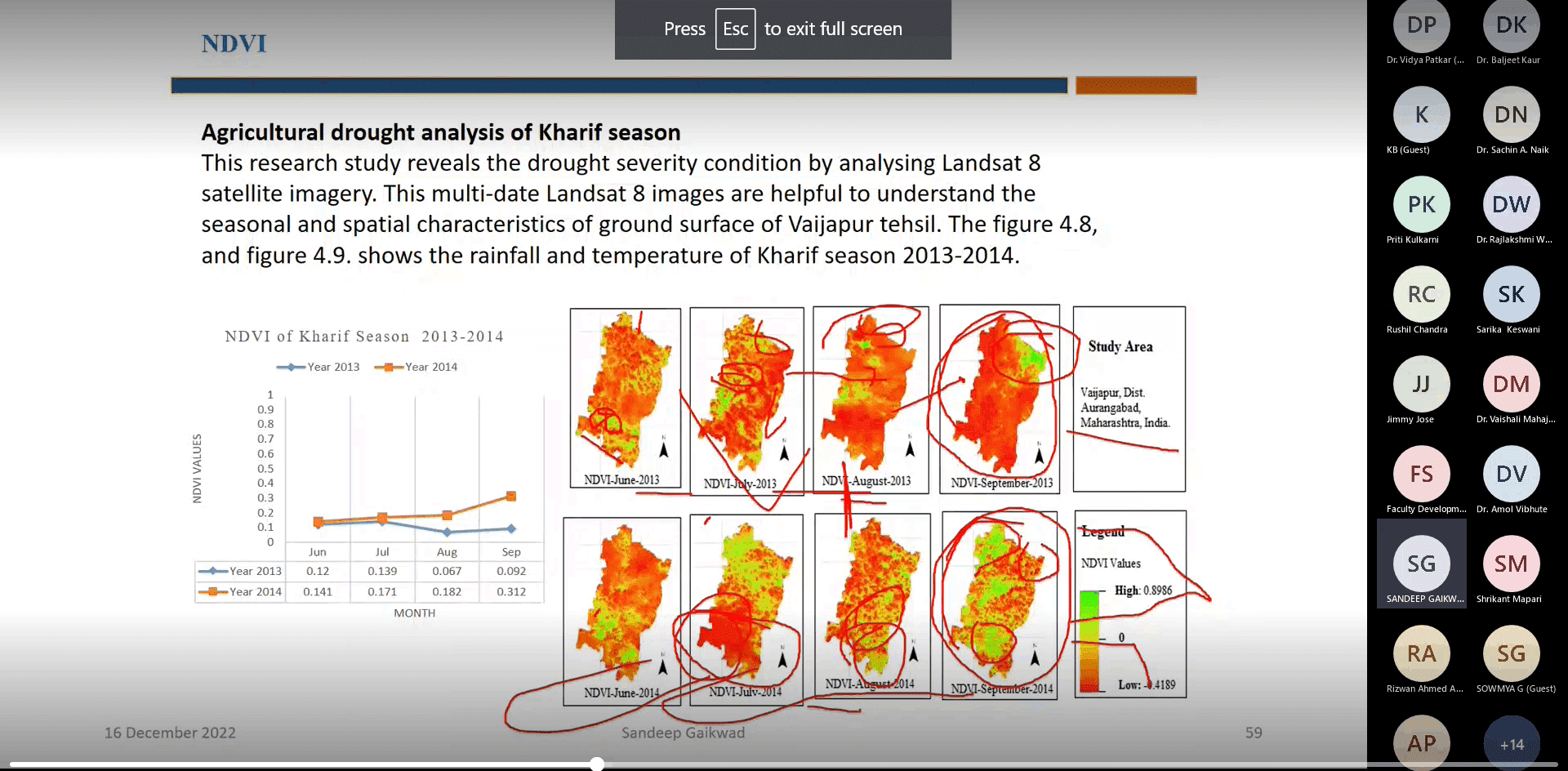
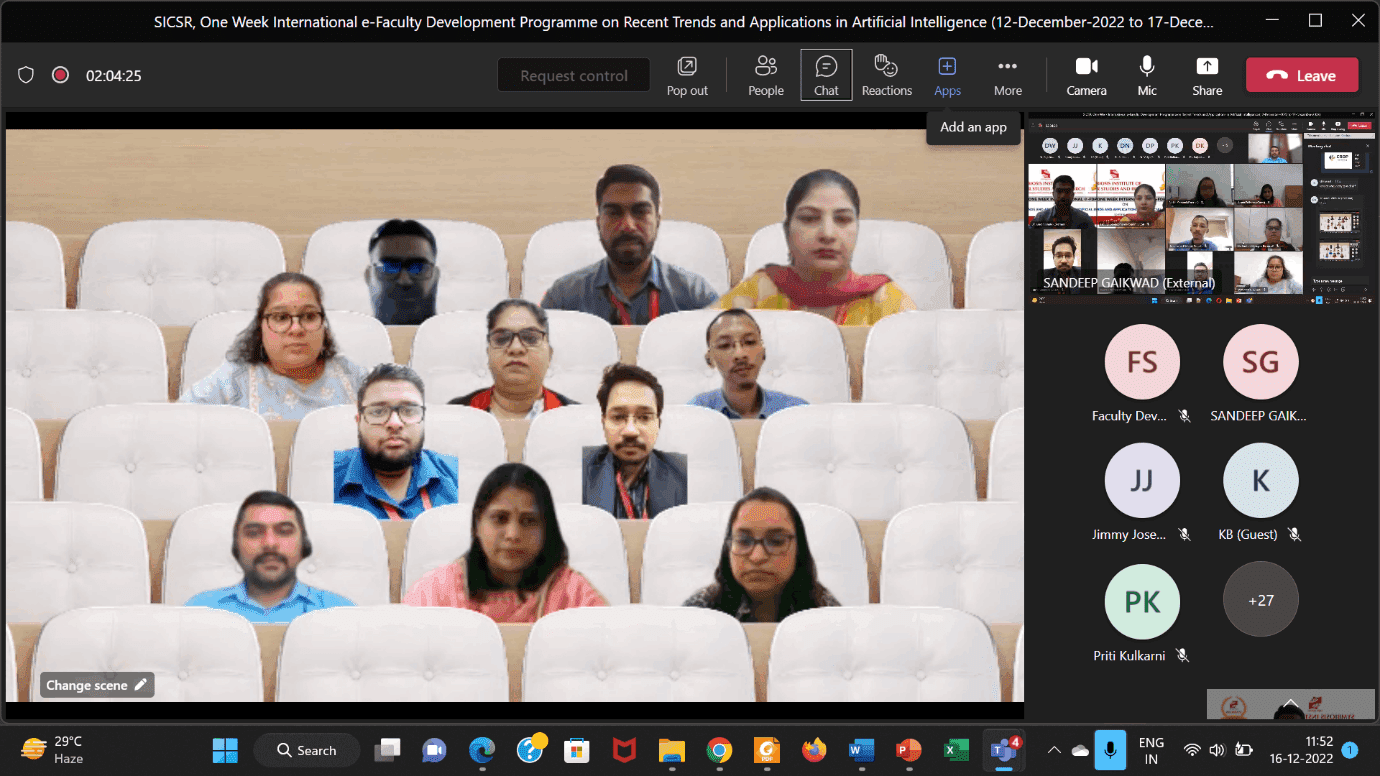
The speaker Dr. Sandeep Gaikwad has introduced the artificial intelligence concepts especially advance machine and deep learning methods used in agricultural applications along with the geospatial datasets for detecting and predicting the droughts episodes at an early stage. He has demonstrated major three types of droughts occur due to intensity, frequency and climatic regimes. In his session, he depicted the use of geospatial technology especially satellite remote sensing datasets and artificial intelligence-based methods for drought analysis. He also presented the implemented results of agricultural drought analysis of Kharif season. The session was excellent and appreciated by all the participants.
10. Topic : Applications of AI in MANET
Speaker : Dr. Baljeet Kaur, Assistant Professor, Symbiosis Institute of Computer Studies and Research (SICSR), Pune.
Date and Time : Friday 16 December 2022 (Afternoon)
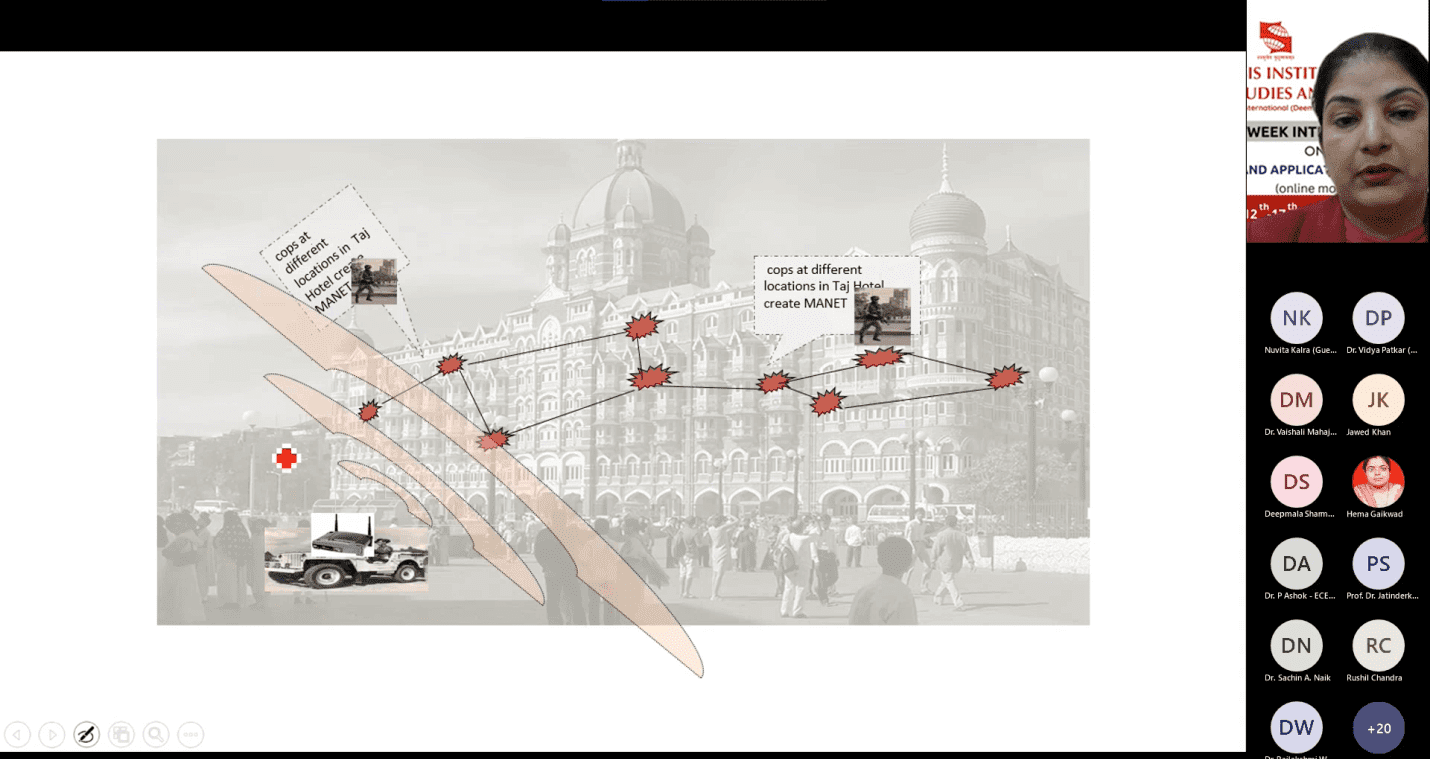
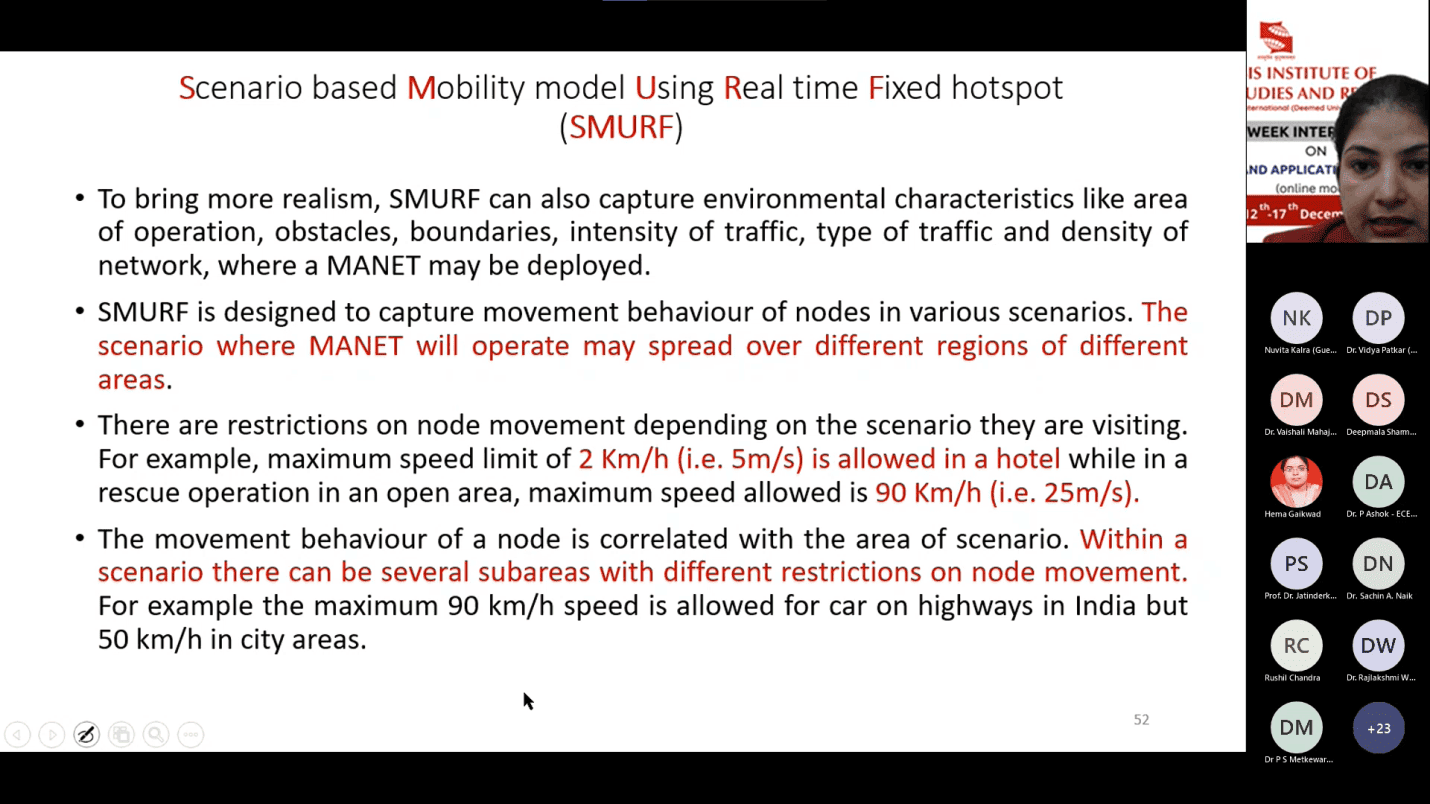
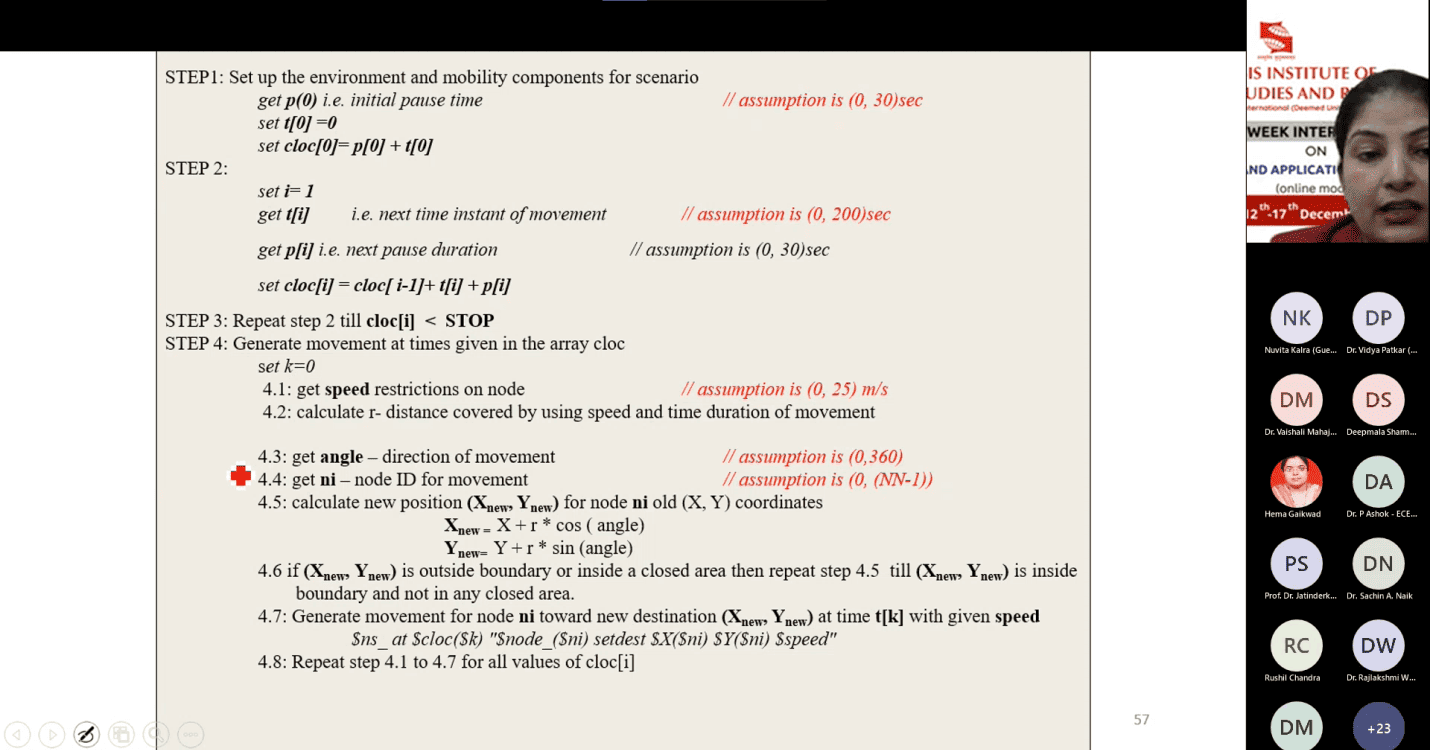
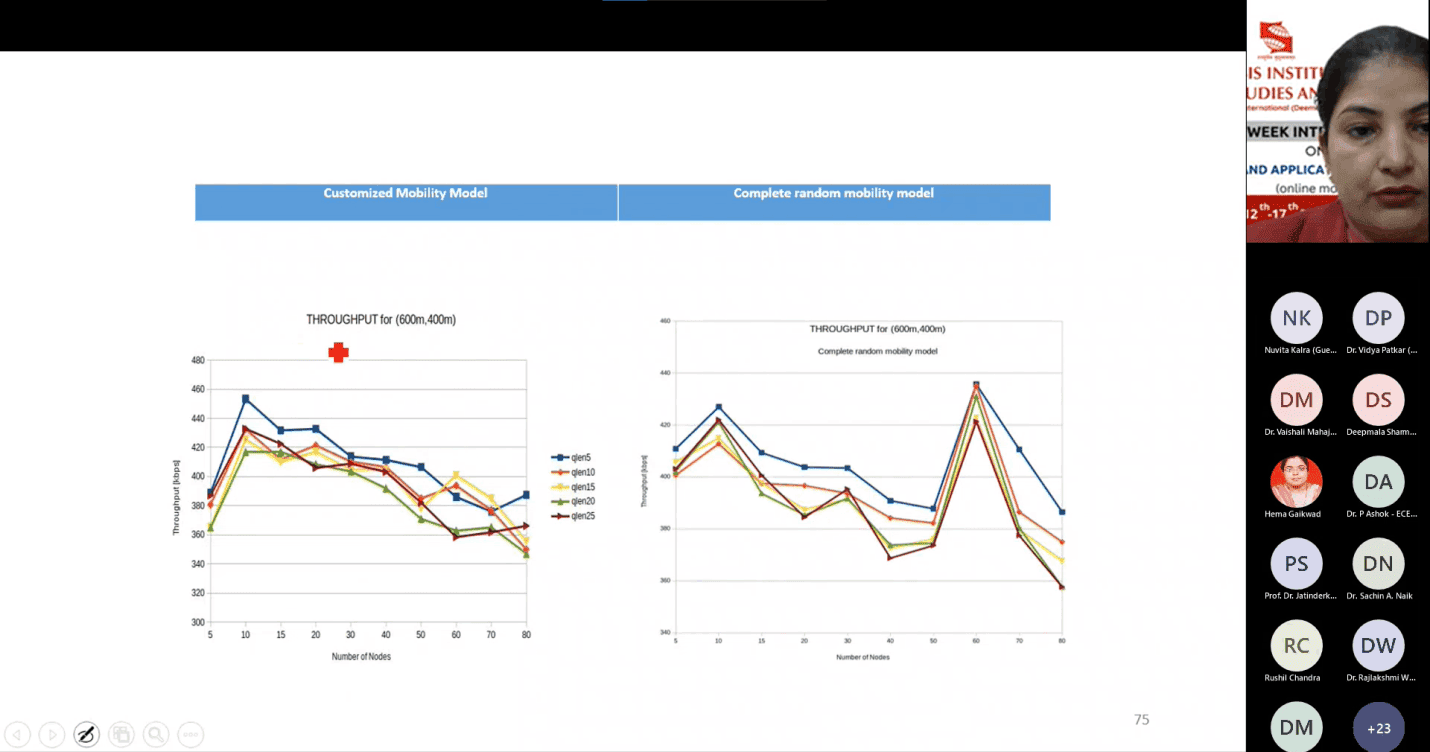
The lecture was given by Dr. Baljeet Kaur, and she had many insightful stories about the subject matter. She even showed a project that she worked on as an example.Mobile ad-hoc networks are a type of wireless network that is composed of a number of mobile nodes. The nodes in the network can communicate with each other without the help from any centralized system or server. They are also called self-organizing networks because they manage themselves and can work on their own.AI has been applied in these mobile ad-hoc networks for several purposes. One such application is to monitor the movement of the nodes in the network and its surroundings, which helps in finding out how to optimize routing between them and also to find out if there are any interference issues or not.
11. Topic : Data Science Tools and Case Study
Speaker : Dr. Vivek Singh, Data scientist, Cognizant Technology Solutions, Noida, India.
Date and Time : Saturday 17 December 2022 (Morning)
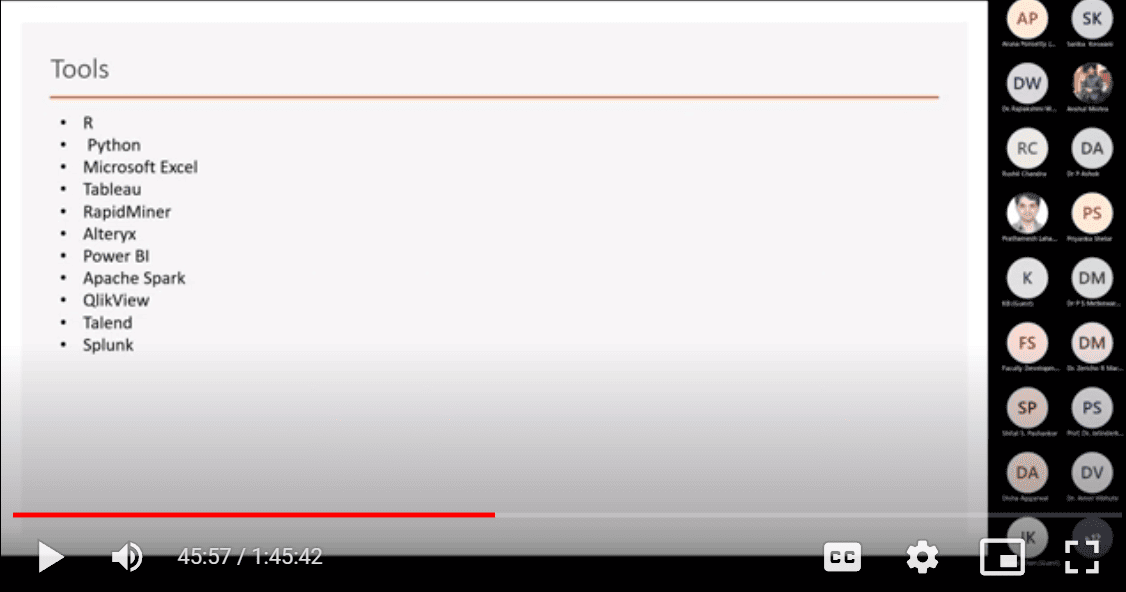
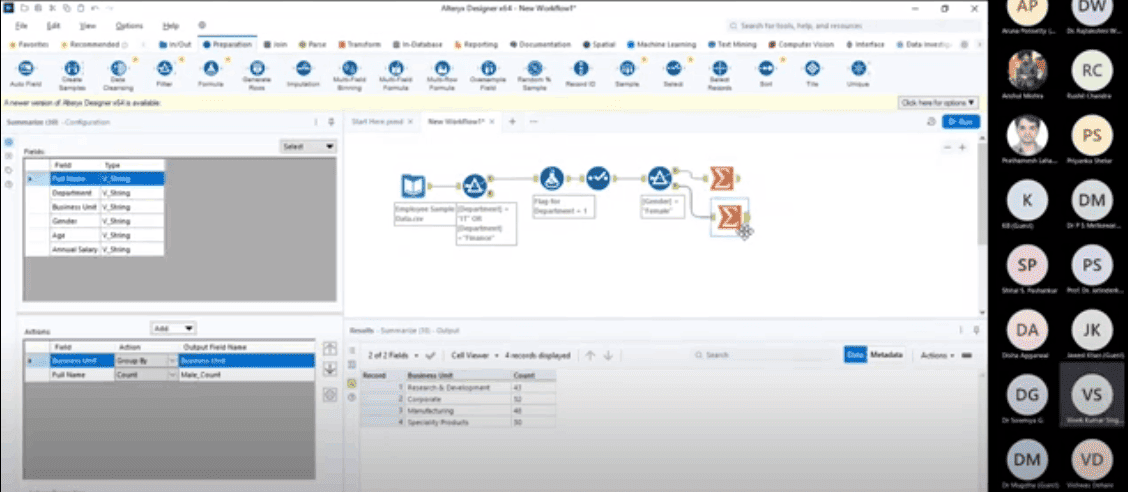
The professor had a good insight about Data visualization tools: Data visualization is an important part of data science, as it allows you to communicate complex data in an easily understandable way. Some popular data visualization tools include Matplotlib, Seaborn, and Tableau. Data manipulation and analysis tools: There are many tools that can be used to manipulate and analyze data, including Excel, SQL, and Python libraries such as NumPy and Pandas In terms of case studies, there are many examples of data science projects that have been successfully applied to real-world problems. For example, a data science team might use machine learning to build a predictive model to help a healthcare organization better identify patients at risk of a particular disease, or they might use data visualization to help a marketing team understand the effectiveness of different advertising campaigns. The specific tools and approaches used in a case study will depend on the problem being addressed and the data available.
12. Topic : AI in Healthcare
Speaker : Dr. Amol Vibhute, Assistant Professor, Symbiosis Institute of Computer Studies and Research (SICSR), Pune.
Date and Time : Saturday 17 December 2022 (Afternoon)
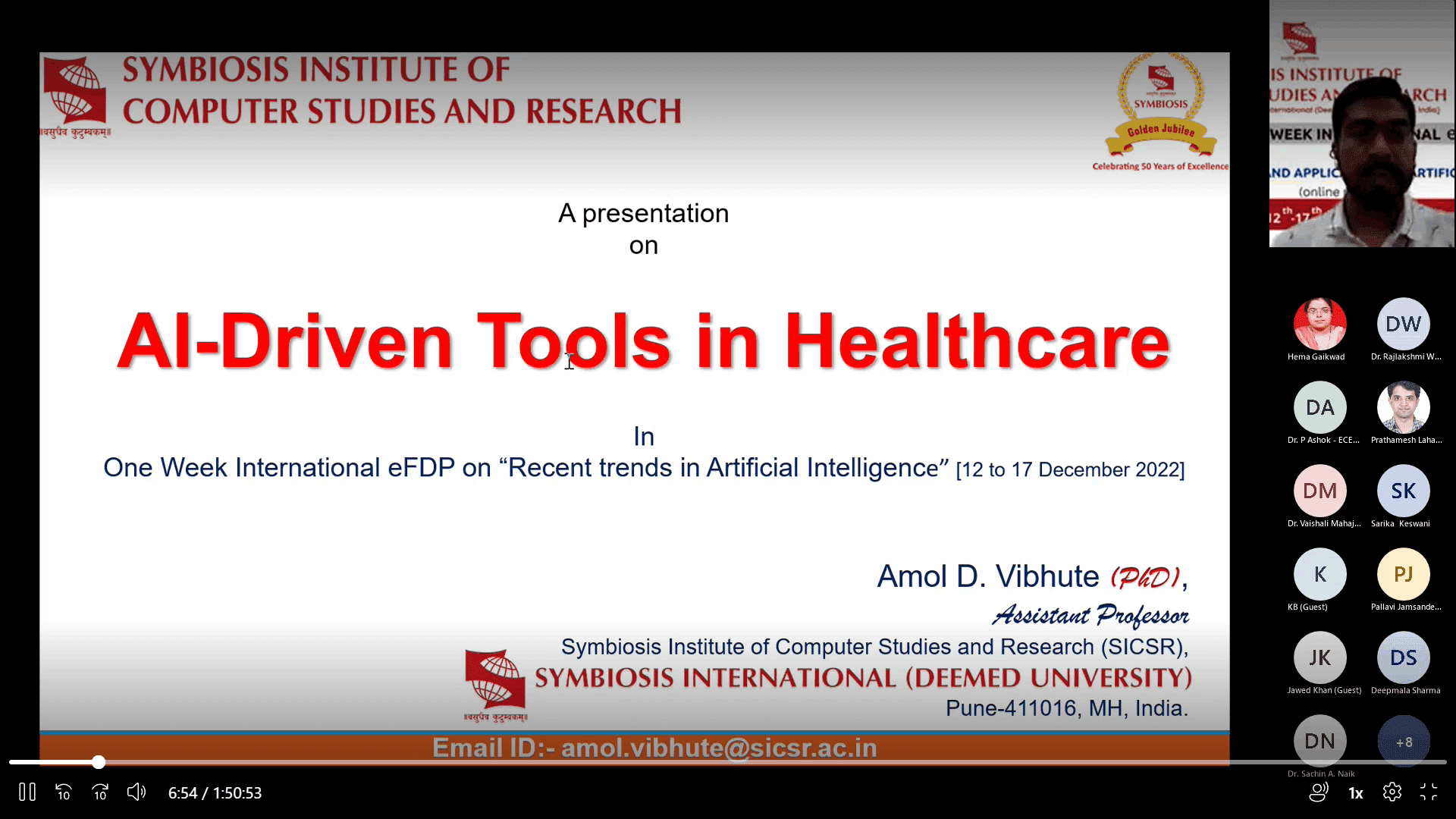
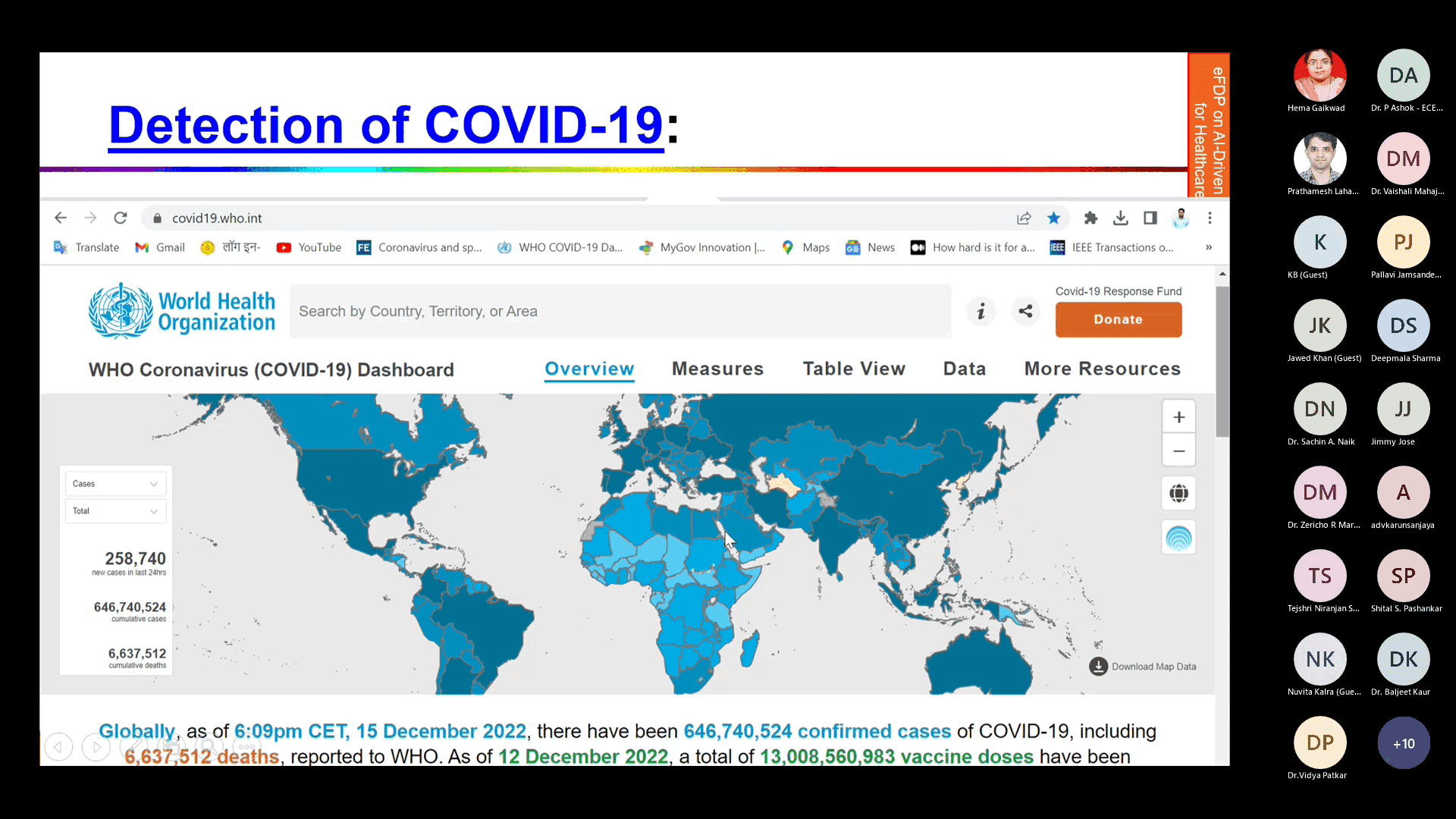
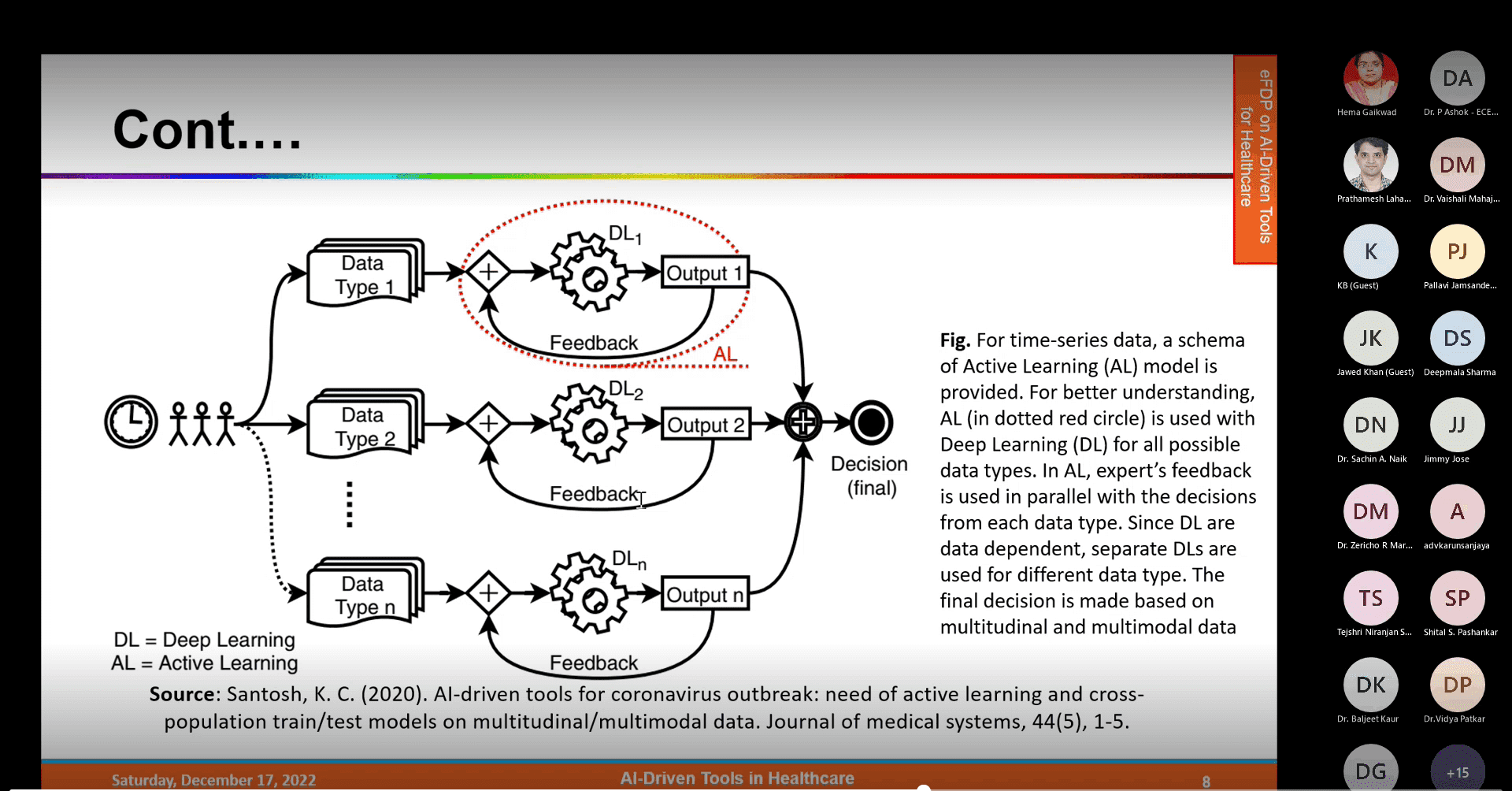
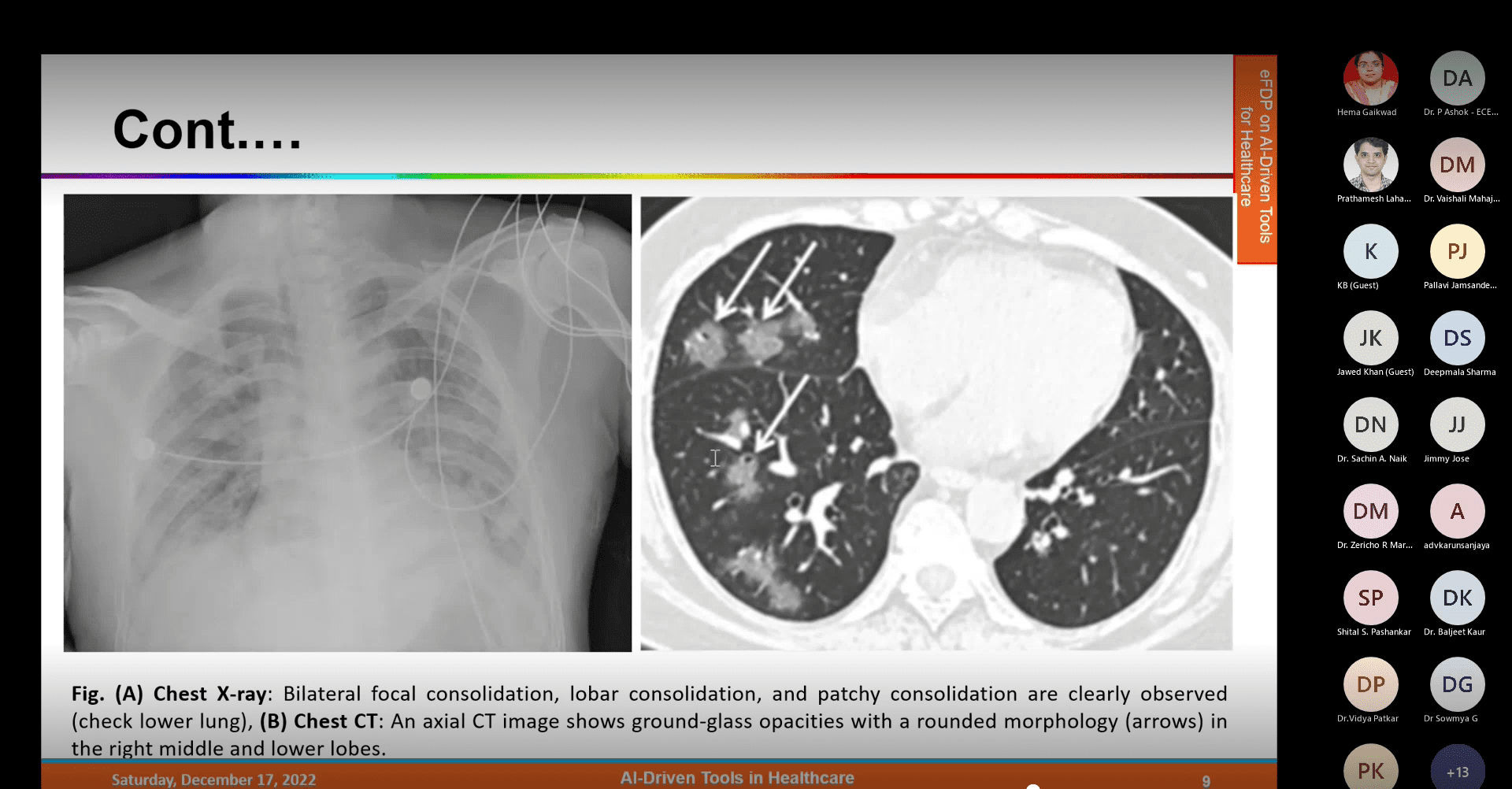
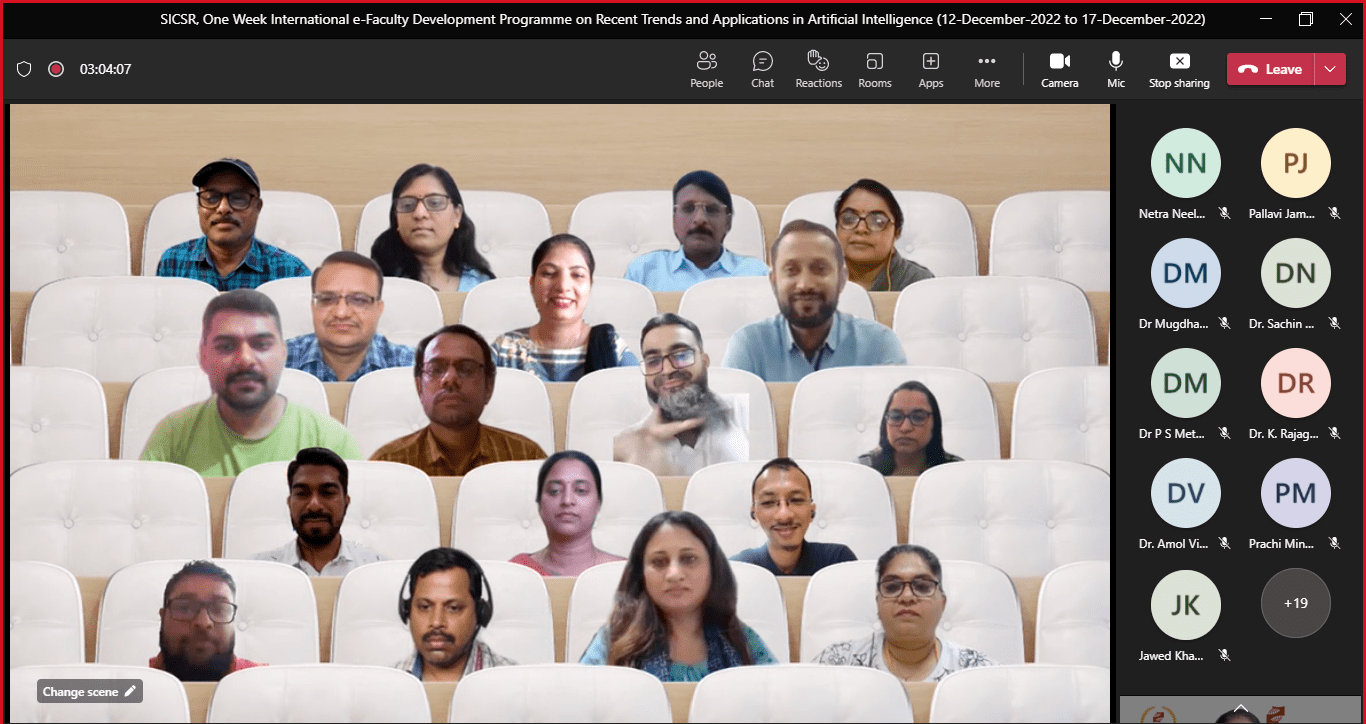
The speaker Dr. Amol Vibhute has demonstrated the applications of artificial intelligence used in healthcare. He shown, how machine and deep learning methods are used in detecting and predicting various diseases at an early stage? He has explained that, the multimodal/multitemporal datasets (chest X-ray and CT scan images), active learning along with deep learning methods can be affectively used in detecting various disease especially COVID-19 cases with best accuracy. He also shown some cases studies on healthcare like COVID-19, Pneumonia, and Tuberculosis implemented using artificial intelligence-based methods. Lastly, he suggested about space technologies (satellite images) that can be used in healthcare with artificial intelligence methods for detecting the hot spots and accordingly taking preventions through it.
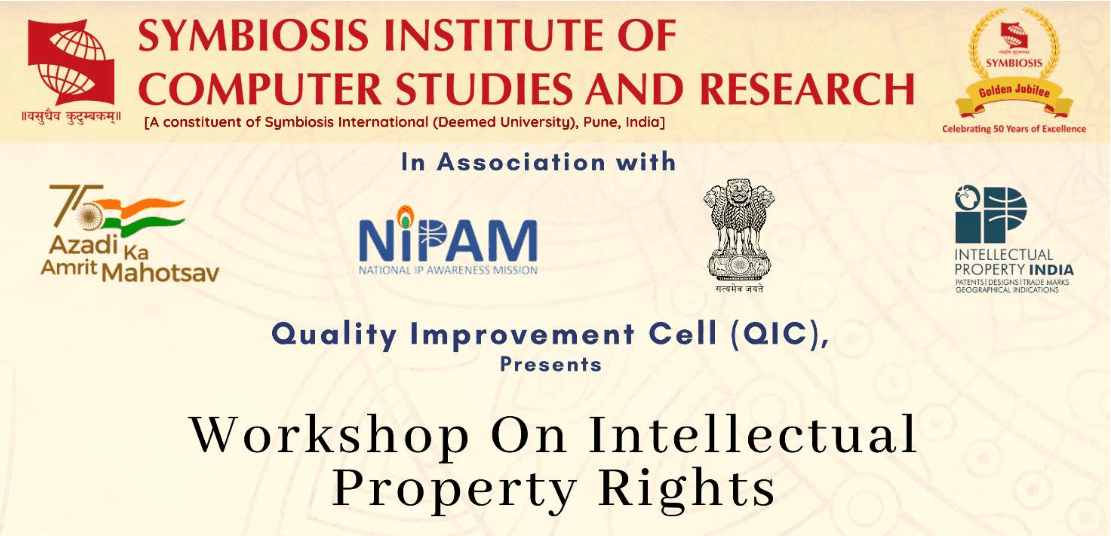
- A workshop on “Intellectual Property Rights” was organized by the Quality Improvement Cell (QIC), Symbiosis Institute of Computer Studies and Research (SICSR), Pune in Association with National IP Awareness Program, Government of India on Friday, 09 th December 2022 in a hybrid mode.
- A total of 227 participants registered for the workshop from about 39 different institutions across the country, including from cities like Silchar (Assam), Amarkantak (Madhya Pradesh) Gandhinagar, Ahmedabad, Anand, Changa, Nadiad (Gujarat), Noida (Uttar Pradesh), Vijayapura, Nipani (Karnataka), Nimbahera (Rajasthan), Bramhapuri, Hyderabad (Telangana), Mumbai, Nagpur, Kolhapur, Solapur, Aurangabad, Nashik, Nanded, Buldana, Parbhani, Bhusawal, Ahmednagar, Jalna, Amravati, Ambad, Omerga, Kalamb, Mohol, and Pune. Among them, fifty percent participants joined the session in a physical mode and remaining participants have joined in an online mode via Microsoft-teams.
- Approximately, 57 participants had completed PhD, another 39 participants were pursuing PhD while remaining participants from non-academic, as well as UG/PG students. Professors, Assoc. Professors as well as Asst. Professors comprised the participants from teaching fraternity.
- The resource person Mr. Arpit Jain was from examiner patents and designs, Patent office, Mumbai, DPIIT, MoCI, Government of India.
- With the blessings and patronage of Dr. S. B. Mujumdar Sir, honourable Chancellor of the Symbiosis International (Deemed University), Pune and Dr. Vidya Yeravdekar, honourable Pro Chancellor of the Symbiosis International (Deemed University), Pune, the workshop was started with Deep Prajawalan by Dr. Sachin Naik (Deputy Director, SICSR, Pune), Mr. Arpit Jain (Expert-Patent office, Mumbai, GoI, India), Ms. Supriya Gandhale (Senior IP Associate, SIU, Pune), Mrs. Shubhashri Waghmare (QIC coordinator-SICSR, Pune) and Dr. Amol Vibhute (IPR workshop coordinator, SICSR, Pune) on 09 th December 2022.
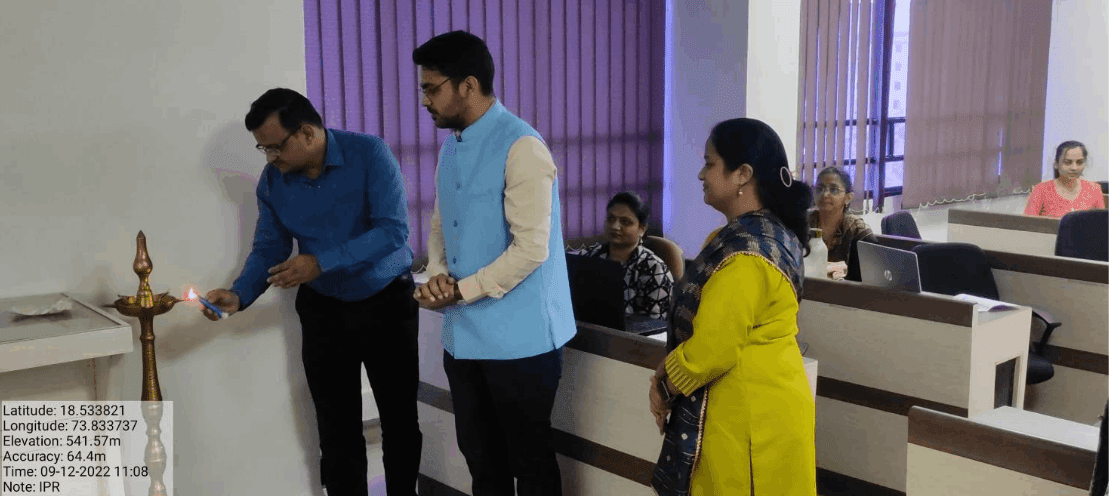
- Brief introduction of speaker (Mr Arpit Jian) was given by Dr. Amol Vibhute, coordinator,
IPR, workshop.
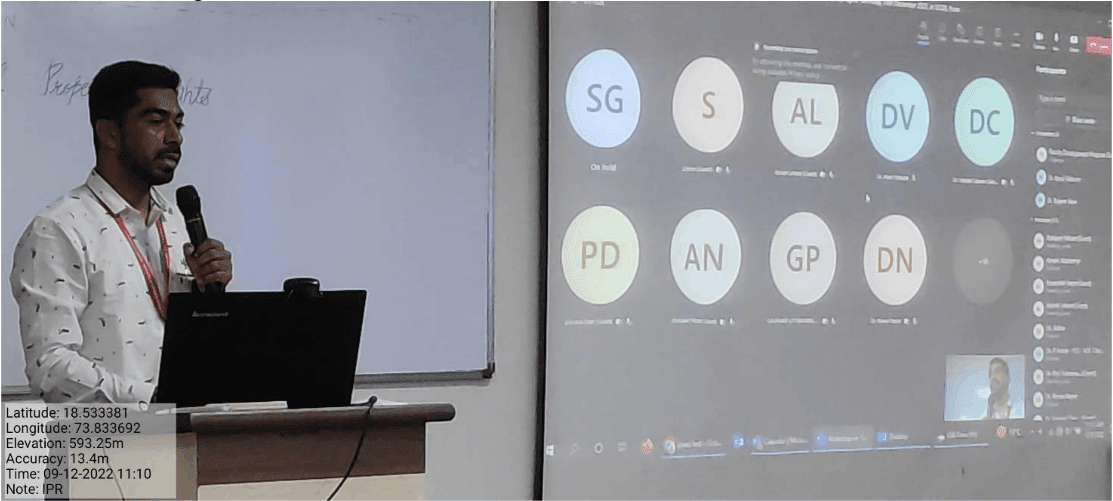
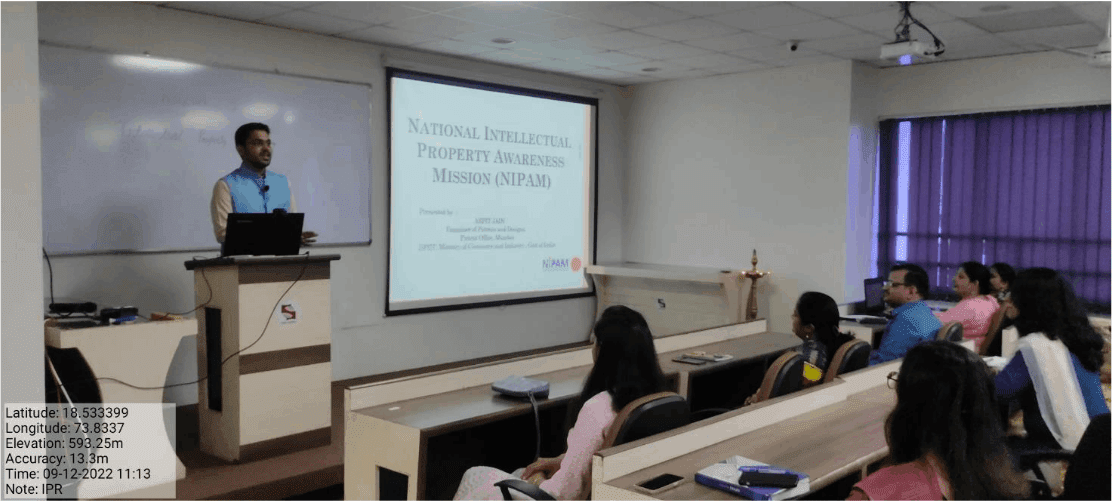
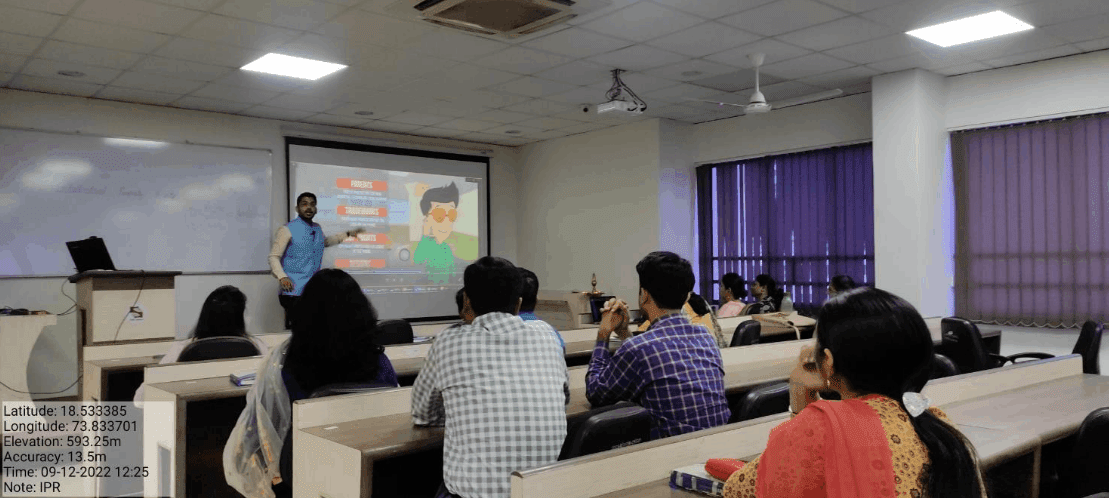
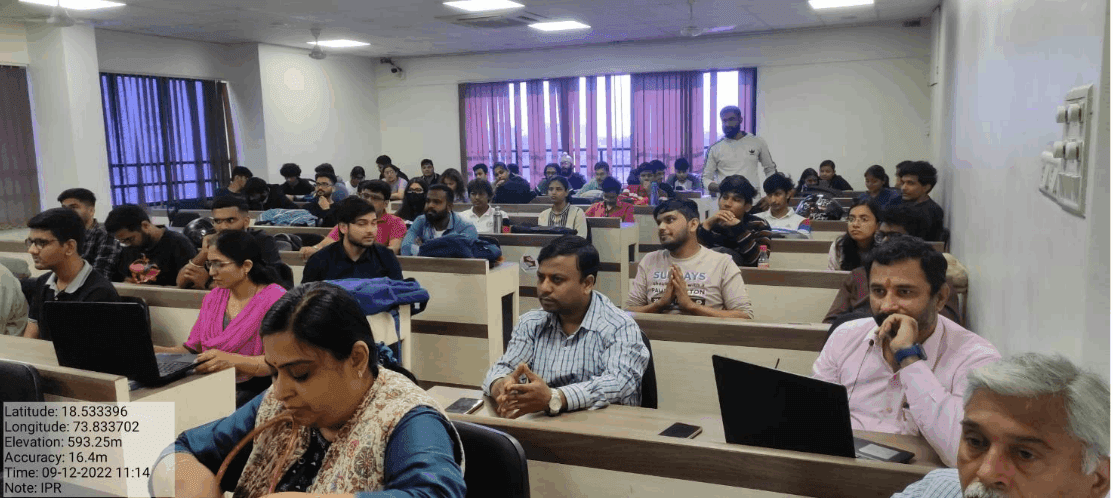
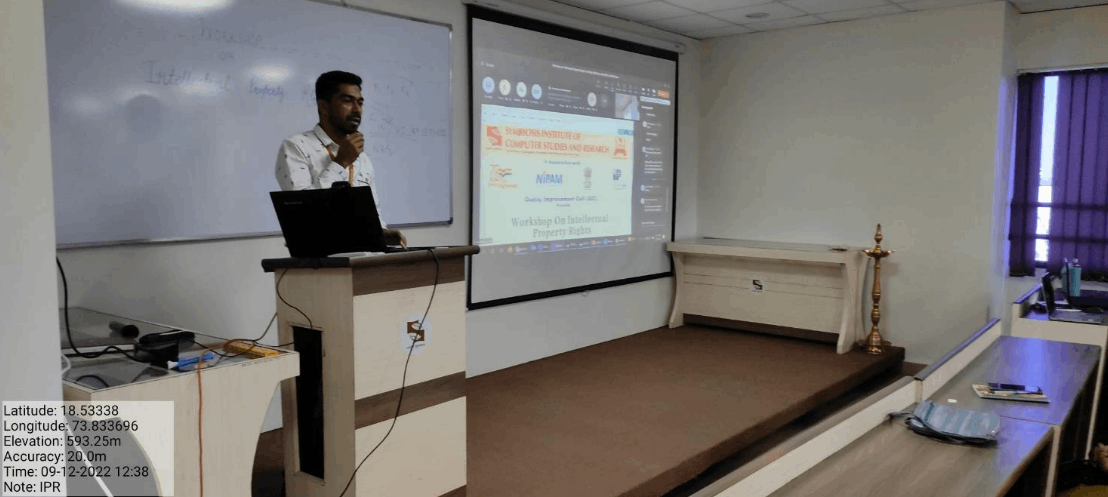
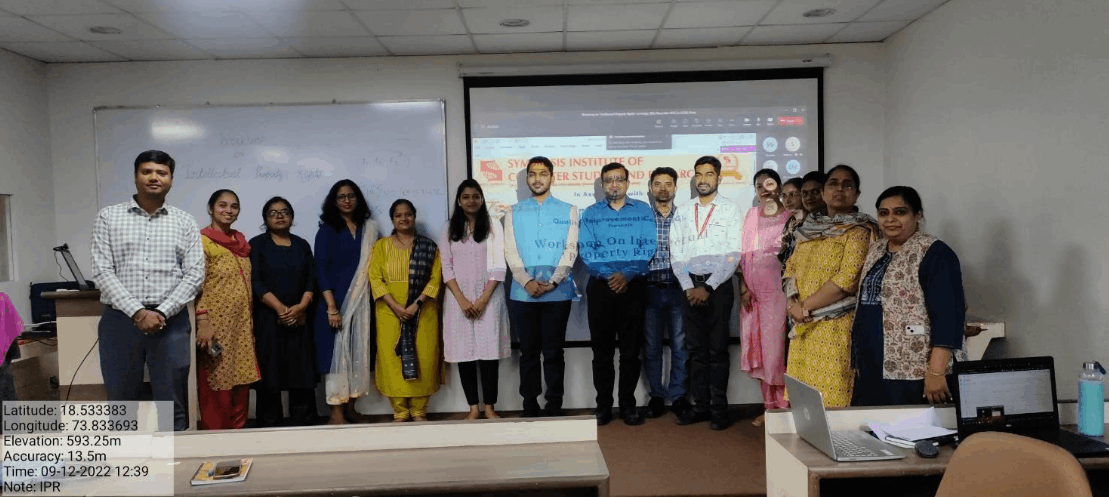
- The workshop was successful in knowledge sharing as well as enabling interests in intellectual property rights. The participants were motivated to innovate their ideas for filing and granting the patents, copyrights, trademarks, etc. All the participants highly appreciated the way of session delivery by expert and his knowledge. 100 percept participants were satisfied with the content delivery by the resource person and the usefulness of contents to understand IPR concepts and the process. The 89 percent participants were positively requested to organize such type of program in future.
One week international e-workshop was conducted on Automation and Data Management from 23-August-2021 to 28-August 2021. The workshop provided a platform to learn about various ongoing processes, tools in automation and data management. It touched upon various topics including design, management, and automation of the flow of data and processes. The robust field of data management is in the evolving stage as enterprises are gradually relying on intangible assets to build value. Very eminent experts and resource persons from industries like Target, L & T Infotech engaged the sessions. The inauguration of the workshop was carried out by SICSR Director, Prof. Dr. Jatinderkumar R. Saini. Among the 51 participants, 56 % were Ph. D completed and 24 % of participants were pursuing Ph.D. The rest of the participants were post-graduate students.

A two week online eSTTP on “Latest Trends in Information Technology (LTIT)” was organized by Symbiosis Institute of Computer Studies and Research (SICSR), Pune during 18th May, 2021
to 31st May 2021. A total of 42 participants including 27 faculty members, 1 placement officer, 1 industry expert and 13 post-graduate students registered for the eSTTP from different universities across
the country. Approximately 60% of faculty member participants
had completed PhD, and around 25% of faculty member participants were pursuing PhD while the remaining 15% of faculty member participants are completed their masters and were willing to do research work. Professors, Assoc. Professors as well as Asst. Professors comprised the participants from the teaching fraternity. Around 50% resource persons were from industries like IBM, C-DAC ( A Scientific Society of Ministry of Electronics & Information Technology, Government of India), IKEA, TietoEVRY, bricshub.com and insuchain, Deutsche Bank, Accenture, Zensar, Apple, Persistent systems. We had resource persons from foreign universities as well as from Indian universities including those who have completed their PhD from IITs. The resource persons joined online from Canada, Singapore, Florida, Kathmandu, Bengaluru, Surat, Ahmedabad, Gandhinagar, Gulbarga , Mumbai and Pune.

eFDP on Data Imputation
A three day eFDP on Data Imputation was successfully conducted by SICSR from 3rd Dec 2020 to 5th Dec 2020. The main objectives of eFDP is to simulate data preprocessing solutions for variable kind of data availability and to understand the process of Data Imputation or data pre-processing. The faculty members, students and experts had registered for the eFDP program. Day one program began with inaugural speech of Dr. P.S. Metkewar Deputy Director, SICSR. He welcomed all the participants and gave brief on 3 days eFDP program. The first day session was on Data preprocessing concept followed by hands on session on “Data Preprocessing using Weka and Python”. The second day sessions focused on Data Imputation, problems and challenges followed by virtual hands on session on Data Extraction using various tools. The third day session was on Handling Heterogeneous Data along with virtual hands-on sessions on Semi structured data preprocessing using Spark SQL.



A five day eFDP on NLP was organised by SICSR from Monday, 26 October 2020 – Friday, 30 October 2020. A total of 64 participants registered for the eFDP from about 25 different institutions across the country, including from cities like Hyderabad, Noida, Ahmedabad, Surat, Baroda, Bengaluru, Bharuch and Pune. Approximately, 45% participants had completed PhD, another 45% participants were pursuing PhD while remaining 10% comprised of participants from industry (like Wipro Ltd.) as well as UG/PG students. Professors, Assoc. Professors as well as Asst. Professors comprised the participants from teaching fraternity.
About one-fourth of the resource persons for technical sessions were either from a foreign university or had completed their PhD from IITs. Approximately one-third of the resource persons were from industries/professional bodies like IBM, TCS, C-DAC (A Scientific Society of Ministry of Electronics & Information Technology, Government of India) and Society for Data Science (S4DS). The resource persons joined online from cities like Berlin (Germany), Surat, Jallandar, Pune, Patiala and Ahmedabad.




One Day Workshop on C and C++ for Teachers was conducted by IIT Bombay on Saturday, 29 February 2020


SICSR organized a workshop on ‘Intellectual Property Rights’ at the institute on 18/01/2020. It was conducted by Mr. Rajendra Ladkat. The speaker gave demo of the products for which he got patents. He also explained the process of patent filing in details and solved the queries raised by the participants.



SICSR organized a three-day faculty development programme in collaboration with IBM
on 3, 4 and 5 October 2019.




